I WISH I HAD SHOT THAT GUY
On March 20, 1986, at 3 a.m. in the Eagle Rock area of Los Angeles, off-duty civilian security guard Ronald Sheridan, aged 51, was not really kidnapped.
At least, that was the idea.

Ronald Sheridan had known something like this was coming. He had a job at Seal Beach Naval Weapons Station where he worked under the title of Site Security Officer, a rank that positioned him as second-in-command of the base's civilian security forces, the sort of job one would colloquially refer to as rent-a-cop. Earlier that March, Ronald Sheridan had been informed that exercises would be conducted to test security at the base and he was given some idea of what had already occurred at other bases that had undergone the same tests—however, as events would soon prove, he was woefully uninformed of exactly what qualified as a test in the minds of his pretend adversaries. The events that followed on that fateful night would eventually serve to burn down one of the US Navy’s most controversial domestic programs, and thrust one of the most outlandish figures to ever run a Special Operations Team into the public spotlight.
When Ronald Sheridan received a call at his home around at 3 a.m. on March the twentieth telling him about a new threat that had been issued to Seal Beach Naval Weapons Station that required him immediately come in to work, he could sense there was something strange going on, but decided to go anyway, a decision that seems inexplicable until you realize it is exactly the sort of dubious choice any person could easily make after being abruptly jarred awake at 3 a.m., a factor his would-be phony kidnappers were no doubt counting on.
As soon as Sheridan exited his home he was confronted by an individual from Red Cell (official name OP-06D), the American Navy special operations team consisting of former Navy SEALs tasked with intentionally thwarting the security of naval installations all over the USA in order to pinpoint their weaknesses to terrorist infiltration and attack. Red Cell operative Frank Phillips[1] pointed an unloaded gun at Sheridan and told him to get into his waiting car, displaying a badge and telling him the operation had begun.
Sheridan's wife Margaret saw the confrontation and, armed with a loaded revolver, moved to protect her husband. Ronald yelled “Don't shoot, it's a security exercise!”
Now, as I look back from my lofty perch in the distant future and sift through the grim facts of the incident that would ultimately prove to be Red Cell's downfall, I can't help but fixate on that one, decisive moment of confrontation in the early morning of 1986 in Eagle Rock.

Eagle Rock is an island of small town charm floating amidst the sprawling metropolis of Los Angeles, a neighborhood that in 1986 still bore lingering traces of the bygone west coast counterculture thanks to the bohemian populace of nearby Occidental College, an institution whose auspicious alumni would eventually go on to include luminaries like Barack Obama as well as the significantly less luminous Ben Affleck, though neither man would actually bother to graduate. Eagle Rock was the sort of place a 51 year old retired cop like Ronald Sheridan could afford to live in by supplementing his pension with a job working civilian security at the local naval base, a kind of neighborhood where the crime is typically petty and people are never kidnapped—in broad daylight or otherwise, pretend or otherwise.
This wasn't Compton, this wasn't any of the multitude of crime-riddled enclaves dotting greater Los Angeles in the 1980's where marginalized people where sequestered by a society that resented their stubborn insistence on continuing to exist. This was Eagle Rock, one of the regions Caucasians had fled to when the phenomenon of white flight drove them and their tax dollars away from urban centers. The serial killer known as The Night Stalker who had terrorized the area had finally been captured a year ago. A crime like armed kidnapping simply didn't happen here, the neighborhood's relative safety was part of the reason why people like the Sheridans settled in Eagle Rock in the first place.
All these factors must have contributed to the intense surreality of that moment in the early morning gloom of 3 a.m. when Margaret Sheridan confronted Frank Phillips mid-abduction, a moment that was no doubt suffused with the faux-stillness of a typical suburban night, the type that seems eerily still until you pay attention for a minute and notice the chirp of nighttime insects, the susurration of distant traffic, the scuttle of nocturnal wildlife, and realize the night is in fact alive with a subtle but furious intensity one is normally is never exposed to, though armed abduction is nevertheless quite the exception.
In that instant all three participants were faced with intense realizations and harsh choices. Margaret Sheridan had to choose between letting her husband go with what certainly seemed like a very real armed kidnapper and possibly never seeing him again, or shooting a man who was, at least in theory, a soldier in her country's military conducting a state-sanctioned and ultimately harmless practice exercise. Ronald Sheridan was forced to choose between letting his wife shoot and thus endangering the life and freedom of all involved, or going to a second location with an armed stranger. For his own part, Frank Phillips was faced with the humiliating scenario of being a former Navy SEAL and current special operations commando who had allowed a housewife with a pistol to get the drop on him during what was supposed to be a simple snatch and grab op, and any further complications would inevitably tarnish Red Cell's reputation as the unstoppable gods of state-sanctioned faux-terrorism.
In the end, the situation resolved itself. Margaret Sheridan listened to her husband when he told her it was just an exercise. Ronald Sheridan listened to Frank Phillips and got in the car. The beginning of Red Cell's activities that evening proceeded smoothly and the car drove off, leaving Margaret Sheridan alone in the middle of the night on an empty street with nothing but the dubious comfort of her husband's assurance that it was just an exercise, just practice for the real thing, there was no true danger.
The events that proceeded to unfold over the course of the next 30 hours naturally invite the question: If the Sheridans had known what was going to happen that night, would they have done anything differently? Would Ronald Sheridan have still told his wife to let Frank Phillips abduct him? Would Margaret Sheridan still have listened to him? Fortunately, in this instance, we needn't speculate, because the Sheridans gave an interview to the Los Angeles Times after the incident, where they both made their feelings on the matter abundantly clear.
“I should have let my wife drop him.” Ronald Sheridan is quoted as saying.
“I wish I had shot that guy.” Margaret Sheridan likewise commented. “It would have stopped all their games.”
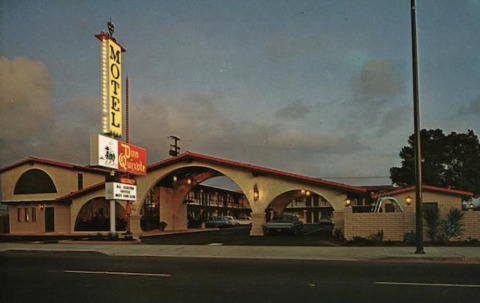
After entering the car, Frank Phillips drove a block away and moved Ronald Sheridan to another car manned by fellow Red Cell operative Arturo Farrias, at which point Ronald Sheridan was blindfolded, handcuffed, and transported to a room in the Don Quixote Motel in Costa Mesa where the trio was joined by two more Red Cell operatives and, for a while, nothing much happened.
Ronald Sheridan's handcuffs had already been removed when the Red Cell operatives stopped to get gas. Upon reaching the hotel Ronald was allowed to call his wife Margaret and tell her he was all right, though he was forbidden from telling her where he was.
Time passed. The men talked. They napped. They watched television. More time passed. Eventually Ronald Sheridan began to ask the other men to take him home, which must have seemed a wholly reasonable request at the time. Red Cell had succeeded in kidnapping him, they had effectively demonstrated the vulnerability of Seal Beach Naval Weapons Station's civilian security officials to enemies operating outside the base, there was nothing of strategic significance left to prove. The Red Cell operatives refused Ronald Sheridan's multiple requests to go home but took no further action, effectively doing nothing worse than creating the world's most awkward slumber party.
Then at around 4 p.m. the next day the members of Red Cell received a phone call, and things changed. Ronald Sheridan was again handcuffed. A pillowcase was secured over his head. He was told he was going to be filmed. Other Red Cell operatives arrived. They went so far as to turn a professional grade floodlight on Ronald Sheridan, so what they were going to do to him could be clearly captured on video.
It was showtime.
What ensued was torture. I won't go into the grisly details right now, though you can if you so desire, they're a matter of public record as alleged in the lawsuit Sheridan would go on to file against the federal government. Suffice to say what occurred that night qualified as torture as defined by the United Nations Convention against Torture, to which the United States is a legal signatory, if not an ardent fan.
One detail I am going to share is they forced Ronald Sheridan's head into a toilet and flushed it multiple times.
Yes, former Navy SEALs abducted a 51 year old man who they knew to be guilty of no crime, and they gave him a swirly in a hotel bathroom. I'm going to ask you to please keep that detail in mind, as it's going to prove crucial to understanding the unique individual at the center of all this.
The torture of Ronald Sheridan began at 5 p.m. Though his filmed torture lasted for about fifteen minutes, he wouldn't be released until 10 a.m. the next day, when he was dropped off at Seal Beach Naval Weapons Station. Red Cell was very fond of delivering flamboyant, unmistakable messages to signal their many successful breaches of base security for the purpose of humiliating the officers in charge; though this was the first time they had conveyed their success by stamping their message into the body and mind of a civilian security officer and dumping him on the base's proverbial doorstep.
Ronald Sheridan would eventually go on to sue the federal government for six million dollars, filing his lawsuit in the U.S. District court on March 17, 1987. He was able to do so because he was not legally enlisted in any branch of the United States Military, and the torture had happened in a hotel instead of on a naval base. If he had been an enlisted soldier, he would have had no legal recourse, which was why Red Cell had been able to do things like this with impunity since 1984.
The Navy never disputed the charges alleged in Ronald Sheridan's lawsuit. The closest it came to venturing an opinion on the incident was, according to Ronald Sheridan's lawyer Carl B. Pearlson Jr., one anonymous Navy official referring to him as a 'crybaby'.
In addition to the United States Government itself, there were multiple individuals named in Ronald Sheridan's lawsuit, one of whom towers above the others: He is the founder of Seal Team Six and Red Cell, a person who endures as a prominent figure in military, security, and conservative circles to this day, and who also just so happens to be the subject of one of the most hideously awful video games ever vomited out into an unsuspecting universe.
I speak, of course, of Richard Marcinko, also known as Demo Dick, aka The Rogue Warrior, aka Shark Man of the Delta, aka The Geek, aka Nut n' Honey, aka The Iron Muffin. (Amazingly, I only made up those last two.)
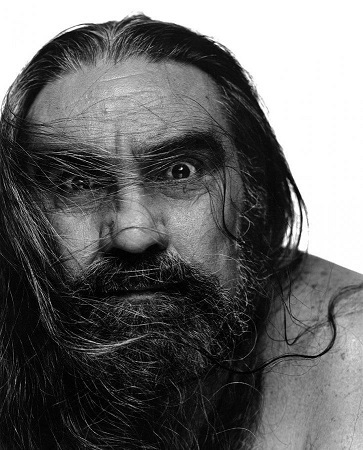
Over the course of his legal action against the United States government Ronald Sheridan would have no doubt become aware of the existence of Richard Marcinko, but to him the creator and commander of Red Cell would have remained an obscure figure. He might have heard rumors of Marcinko's caviler attitude, disdain for the rigid hierarchy of Navy officialdom, and storied record of elite soldiering at home and abroad, but that would have been all they were, rumors. The autobiography Marcinko would pen during his time in prison titled Rogue Warrior wouldn't be published until 1992, at which point Ronald Sheridan's case had been settled and he, I dearly hope, had begun to move on with his life. I don't know if Ronald Sheridan followed Richard 'Demo Dick' Marcinko's post-military career as the former Navy SEAL commander did what would today be called 'growing his personal brand', accruing a relatively small but decidedly fierce cult of followers who regarded his former military career's death-defying escapades, flamboyant violence, and ingrained fuck-you attitude with a quasi-religious awe.
Ronald Sheridan died on August 20, 2010 at the age of seventy five, meaning he lived just long enough to see the video game adaptation of Rogue Warrior visited on an innocent public on November 26, 2009. It's unlikely Ronald Sheridan happened to encounter the Rogue Warrior video game in the fading twilight of his life, but it is possible, and it presents a tableau so compelling and bizarre I can't help but at least try to imagine it.
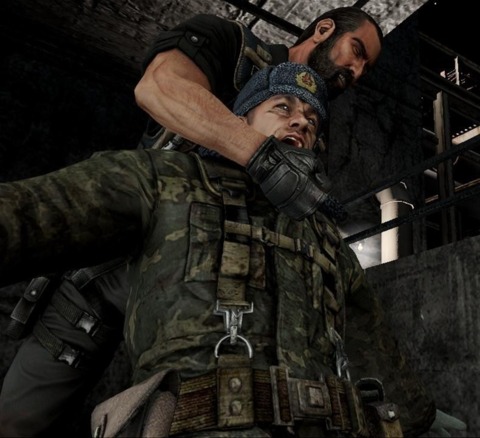
Picture yourself as a security guard who is kidnapped, tortured, and released by a special operations unit called Red Cell in the employ of your own government. You live out the remainder of your life, drawing some solace from Red Cell being dissolved soon after your encounter, and over the course of twenty four years manage to come to some sort of terms with what happened to you. Then, in the final months of your life, you encounter a video game based on the real life individual who engineered your torture in 1986, only in the video game's version of 1986 he isn't torturing his fellow Americans, he's massacring hordes of North Koreans and Russians, he's shooting and stabbing his way through a crude three dimensional landscape, and he's voiced by none other than celebrated actor Mickey Rourke, who's spouting pithy one-liners such as “I'm gonna fuck your mother in the ass and then I'm gonna chop her fucking head off, okay?”, to cite just one example. (For the record: No, it isn't okay.)
What would that do to your psyche? Would it reignite past trauma? Would it seem even more hilariously stupid to you than it already is to the average layman? Would you even be capable of comprehending what you were looking at? Would reality cease to have all meaning?
What would encountering the same video game be like for all the other Americans Red Cell tortured, but who couldn't sue the government because they were legally enlisted in the military at the time?
The possibilities are endless, the reality more audacious than anything even the most unhinged author would presume to invent, which is why the video game Rogue Warrior is so worthy of our attention. Rogue Warrior is initially alluring due to its reputation for being so infamously terrible—and by God it certainly is at that—but Rogue Warrior has so much more to teach us if we're willing to scratch beneath its ridiculous, idiotic surface.
The Rogue Warrior video game stands at the nexus of a multitude of intersecting cultural forces: the celebrity soldier, the fetishization of the military, the whitewashing of history, the pitfalls of video game production, the perils of expanding a brand across different forms of media, the inherent futility of trying to cram gritty realism into consumer-grade entertainment; and, of course, at the center of it all is the man himself: bigger than life, twice as mean, three times as manically cruel, four times as obscene, one half as intelligent which is still two thirds more intelligent than you'd think at first glance, tough as nails and equally devoid of conscience, the self-proclaimed Rogue Warrior himself: Richard 'Demo Dick' Marcinko.
a note on nicknames before we proceed
I'm going to be bestowing a lot of fake nicknames on Richard 'Demo Dick' Marcinko (real) over the course of this piece, because he himself is positively obsessed with giving people nicknames, and in the process of researching him I found his love of nom de guerres to be contagious. The nicknames Richard 'Osmosis Jones' Marcinko (fake) bestows on people in his autobiography include but are not limited to
- Minkster
- Baby Rich
- Horseface (aka Ho-Ho-Ho)
- Wiseass Artie
- Cheeks
- Chargin' Charlie
- Snake
- The Duke
- Mugsy
- The Senator
- Trailer Court
- Mud
- Pepperman
- Fingers
- Indian Jew
- Pooster (aka The Rooster, though Marcinko states 'I always thought we should have called him Pooster the Booster'. He is also referred to as 'Meesta Poosta Roost')
- Gold Dust Larry and Gold Dust Frank (aka The Gold Dust Twins)
I swear I made none of those up.
SCREW EVERYBODY BUT US

Richard 'Jewel of the Nile' Marcinko is a man of humble origins, great ambitions, and incredible accomplishments. (as of this writing he is still with us, having recently achieved octogenarian status and showing no signs of slowing down) [EDIT 12/27/21: Marcinko has since passed away.] In this way he embodies the popular version of the American Dream, being a man of wit and gumption who prospered through honest toil to achieve financial success. Richard 'Bleeding Nugget' Marcinko is also an unrepentant torturer who has visited immeasurable harm on a multitude of innocent people. In this way he embodies the less popular but no less prevalent version of the American Dream, the churning Machiavellian scramble for power and wealth at any cost. Richard 'Lucky Number Slevin' Marcinko is extremely open about his monomaniacal pursuit of success, no matter who he hurts along the way. He believes victory justifies itself, irrespective of what it took to achieve it, or how pyrrhic said victory ultimately proves to be.
I am not just inferring these conclusions from Richard 'Horsey Sauce' Marcinko's behavior, he says as much himself. The tenth commandment of The Rogue Warrior's Ten Commandments of SpecWar as proselytized in his self-help book Leadership Secrets of the Rogue Warrior: A Commando's Guide to Success, reads as follows:
10. Thou shalt, in thy Warrior's Mind and Soul, always remember My ultimate and final Commandment: There Are No Rules—Thou Shalt Win at All Cost.
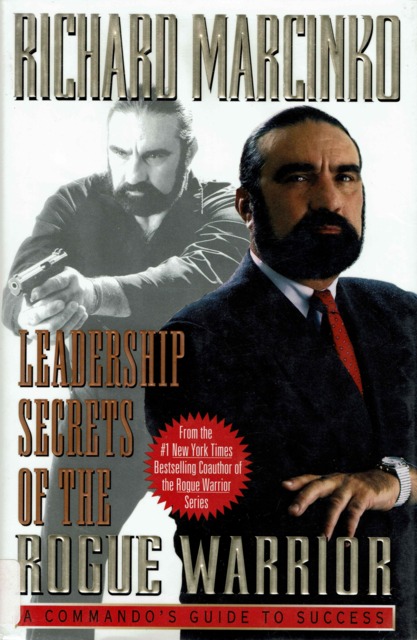
Notice that he capitalizes the word 'My', putting himself on the same level as the Abrahamic God, which makes sense given the Old Testament God-style of leadership he subscribes to, a divine being that issues unquestionable orders, demands absolute loyalty, and places little to no value on human life. I don't think Richard 'Tetragrammaton' Marcinko ever commanded two bears to kill 42 children because they mocked a man for being bald (2 Kings 2:23-25) yet it's also the sort of thing he wouldn't balk at doing if he thought it would lead to victory.
Taken on its own, this attitude would do little to distinguish Richard 'Fickle Tickler' Marcinko from any other corporate pirate, but he is also a product of his times. In the 1970s and 1980s Demo Dick would prove to be at the vanguard of a changing United States military that, after experiencing a string of humiliating defeats ranging from the loss of the war in Vietnam to the failure to save American hostages being held in post-revolutionary Iran, would finally be forced to abandon the tactics that had proved so successful in World War Two and so utterly ineffective ever since, a shift from massive, general purpose military forces to smaller, more specialized units that Richard 'Parliament Funkadelic' Marcinko was specially poised to capitalize on.
I'm going to only give a cursory account of Richard 'Jumbo Juggler' Marcinko's life prior to his establishing Seal Team Six, since that's when the circumstances first began to take shape that would eventually bring about Red Cell, his imprisonment in 1990, and the composition of his bestselling memoir Rogue Warrior, a book that would serve as his springboard to a very special kind of fame, creating an enduring Rogue Warrior brand that would culminate in the video game of the same name in 2009, starring him as voiced by Mickey Rourke and as portrayed by computer graphics that were disturbingly crude even by the standards of the time.
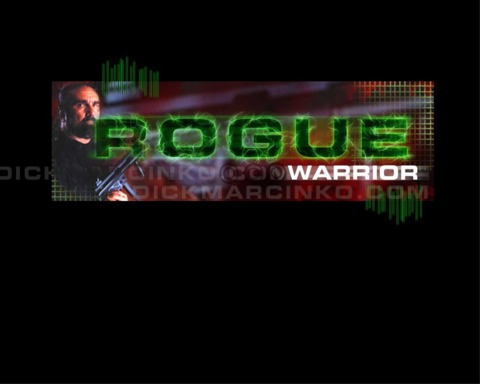
In brief: Marcinko (pronounced Mar-SINK-oh according to his now-defunct website circa January 4, 2010, a period of time I'm drawing from because it's approximately one month after the video game Rogue Warrior was released in the United States) joined the Navy in 1958 as a humble teletype operator and eventually worked his way up to joining an elite Underwater Demolition Team, the same organization Jesse 'The Body, The Mind, Abraxas Guardian of the Universe' Ventura was a part of, the same organization that would eventually be turned into the famous Navy SEAL special operations team. In 1967 he was deployed to Vietnam where his unit, dubbed SEAL Team Two, ventured behind enemy lines on covert missions to directly attack Viet Cong guerrilla outposts, and also participated in defensive operations during the Tet Offensive.
In 1973 he served as a military adviser to the Cambodian government in its war with the Khmer Rouge, then left to take command of SEAL Team Two. After the disastrous failure of Operation Eagle Claw in 1980, during which the Army's elite Delta Force attempted to free American hostages being held in Iran only to end up killing eight of their own when an attempt to abort the mission resulted in a helicopter crash, Richard 'Diaper Dynamo' Marcinko was tasked with creating a new, elite military unit specializing in counterterrorism and hostage rescue using Naval forces, and doing it as fast as humanly possible. According to his memoir:
“ 'CNO Hayward sent me down here. You know what he fucking said, gentlemen? He said, ''Dick, you will not fail.'' ' ”
Thus SEAL Team Six was born.
“I called the unit SEAL Team Six. Six because there were already six platoons that had received CT[counterterrorism] training. And Six because the number would make the Soviets believe that there were five other SEAL teams somewhere, when there were in fact only two. Doom on you, Russkies.”
“SEAL Team Six would be run according to Barrett's First Law of the Sea, and Marcinko's First Law of Unit Integrity: screw everybody but us.”
Demo Dick's training methods ranged from the unconventional to the grueling to the hellish, virtually all of which included some element of superfluous cruelty, but the end result was one of the best elite fighting units the world had ever seen. There was only one problem.
They had nothing to do.
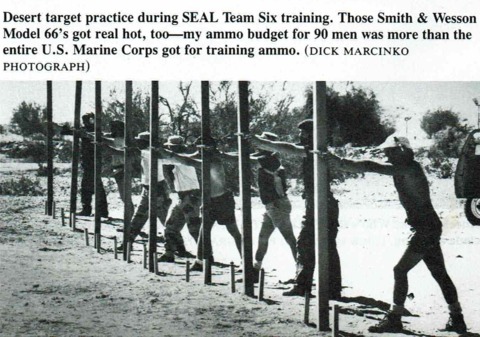
In Richard 'Monosodium Glutamate' Marcinko's books and on his website he says his team engaged in missions in regions such as Central America, the Middle East, the North Sea, Africa, and beyond; all of which is true, but neglects to mention one key detail: every single operation was a training exercise. The bullets to be fired were nonlethal, the terrorists to be killed were in the employ of the same government SEAL Team Six fought for, the hostages to be rescued were actors, and the stolen nuclear weapons to be recovered were dummy warheads, every single time. Seal Team Six was never told beforehand that the operations were simulated, which would have defeated the point of testing the unit's readiness, and there were many real hazards to be navigated even without real enemies to fight, but there was no proper 'action' to be seen. Demo Dick is frank about this in his memoir, saying
“So SEAL Team Six trained and rehearsed and drilled—all balls to the wall. But we did no actual counterterror.”
Irrespective of the location of their balls relative to the wall, peace, to Richard 'Blushing Ingénue' Marcinko and his cohorts's endless consternation, endured.[2]
Without any terrorists to counterterrorize, SEAL Team Six was placed in the awkward position of having to justify its existence, a task that was rendered far more difficult with a commander who actively antagonized fellow Naval officers at every opportunity. Demo Dick surrendered command of SEAL Team Six in July of 1983, effectively forced out under a cloud of controversy, antipathy, and resentment. By his own admission:
“I felt empty, alone, betrayed, enraged.”
Then, in 1984, the Navy turned around and gave the very same Richard 'Flirty Neptune' Marcinko it had just forcibly deposed from a position of authority full command of Red Cell, a unit tasked with testing the security of Naval bases and given carte blanche to do anything to the soldiers within short of killing them.
How anyone could have possibly thought this was a good idea remains a complete and total mystery.
Richard 'Butter Baron' Marcinko was, for his part, was ecstatic.
“After almost a year of preparation, staffing memos, and bureaucratic infighting, I was able to assemble my troops and say the secret words: 'We're gonna be terrorists.' ”
Red Cell would go on to accrue an incredible record of successfully subverting the security of Naval bases and a hideous record of gross human rights violations until they finally went too far with the kidnapping and torture of Ronald Sheridan which, thanks to a unique confluence of bureaucratic technicalities, the government could be held legally liable for. After Ronald Sheridan filed his lawsuit against the government the rules of engagement Red Cell was forced to abide by were rigorously tightened and funding for the program was gradually withdrawn until the unit was finally starved of resources and dissolved.
After such a humiliating ordeal, someone had to be punished.
The Navy needed a scapegoat.
Instead, in a stunning instance of sanity prevailing, they ended up punishing Richard 'Donner Blitzen' Marcinko, the man who was actually responsible and who deserved to suffer the penalty of his crimes.
Despite Richard 'Shaggy Butler' Marcinko's reputation for brutal candor, he is willing to omit certain facts from his accounts of his life that don't quite fit with the image he likes to project. His 1992 memoir makes no mention of Red Cell's practice of systematic torture. Likewise, his 2010 website makes no mention of the video game starring him. I don't mean to imply any sort of moral equivalency between the two, but it does beg the same question I find myself asking in one form or another again and again as I survey the details of Demo Dick's life: How did anyone think this was a good idea? Even before the development of the Rogue Warrior video game turned into a fiasco, how did anyone at publisher Bethesda think the author of the sentence “And then we'll go back and we find those sorry motherfucking cocksucking pencil-dicked shit-for-brains pus-nuts goatfucker assholes who screwed with you, and we ream them new sphincters.” and who also happened to have a public record of gross human rights violations was the hero the gaming public was crying out for?
As we embark on our journey to try to answer this question, let's begin by taking a look at the game itself, and the titular Rogue Warrior at the center of it all.
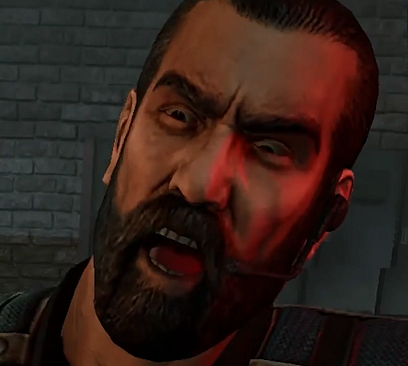
FULL FUCKING FAULKNER
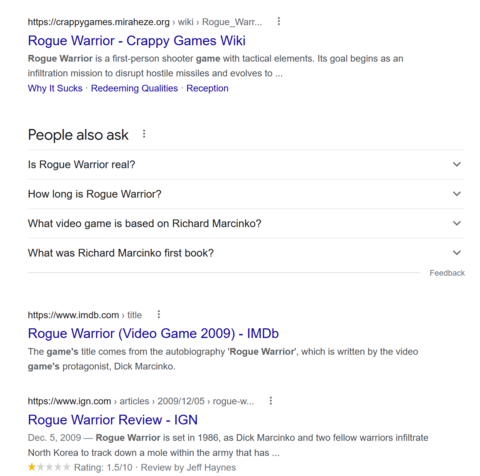
If you Google the phrase 'rogue warrior game', one of the questions often listed in the 'People also ask' section is 'Is Rogue Warrior real?', which makes sense. I've played Rogue Warrior to completion (not a brag, but a confession), yet that same question still haunts my mind. My time with Rogue Warrior seems like a fever dream, the sort of nightmare that's too incoherent to be truly frightening, yet still manages to disturb by confronting you with a merciless deluge of random imagery, exhausting your capacity to reason and reducing you to a crude, animalistic state not unlike that of the game's deranged, rabidly homicidal protagonist.
Playing Rogue Warrior isn't painful per se; it's more like a bad trip, the sort of demented hallucinogenic episode that turns your mind against itself and leaves you huddled in a corner, assailed by mad visions and praying for sanity's return—or at least for Mickey Rourke to stop talking about his testicles for five goddamn minutes.
The very existence of Rogue Warrior is a mystery, one that I would liken to a black hole. Yes, we know that black holes are real, but the ways they warp reality are so baffling and unfathomable it would almost be easier to explain them away than cope with the mind-boggling implications of their existence. As I forced my way through Rogue Warrior, grimly trudging from its inauspicious beginning to its ignominious end, my thoughts withered under the barrage of its designers's inexplicable choices, overtaxing my mind to such a deranged extent that it that threatened to throw into question everything I thought I knew about the universe and my place in it.
If anything positive can be said about the Rogue Warrior video game, it is this: much like Richard 'Fatal Discharge' Marcinko, it is very upfront about its disdain for the human race. If there is any trace of doubt in your mind that Rogue Warrior is anything other than a game by assholes, for assholes and the people who ironically appreciate their assholery, it will be washed away by the difficulty options screen, which presents itself as follows.
RECRUITS—If you're a pussy, select this one.
REGULARS—Bring it on, motherfucker.
ELITES—Think you're fucking special, huh?
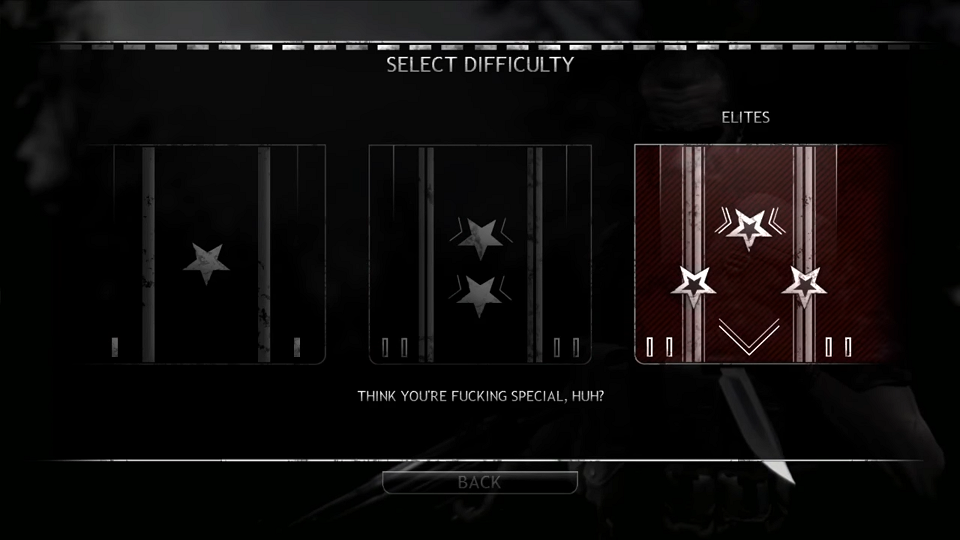
The 'Elites' option may be the most true to life, since it is abundantly clear Richard 'Magikarp' Marcinko does indeed believe himself to be a fucking special individual, the man who puts the 'Special' in 'Special Forces'.

For anyone who's ever bemoaned the scourge of ludo-narrative dissonance afflicting video games, Rogue Warrior is a dream come true. Demo Dick is not Nathan Drake, a bumbling but affable hero who's cracking wise one moment and slaughtering people the next. The gameplay of Rogue Warrior has Richard 'Red-Faced Warbler' Marcinko behaving like a blood-crazed psychopath, and the cutscenes and dialogue of Rogue Warrior have him behaving like a blood-crazed psychopath. Granted, this does nothing whatsoever to improve the experience of playing the game, but it is tonally consistent, which is something people seem to really care about for some reason.
Rogue Warrior opens with the following narration delivered by Micky Rourke in a gruff, flat monotone he will not deviate from for the entirety of the game:
“A spec warrior. One who gives a fuck. That's me. Whether I'm prowling and growling or going Full Fucking Faulkner with lots of sound and fury, you count on this: I get the job done. Today that means flying under the radar deep in North Korea. The brass running this op is a desk jockey named Travis Mayhew. He tells me the mission is beyond classified, so I'm running a skeleton crew. Minimum footprint, maximum impact. S.O.P. for assholes like me.”

Mickey Rourke lends his voice to the game's portrayal of Demo Dick, but it would be inaccurate to call anything he does over the course of the game 'acting'. There is no inflection, no intonation, no charisma of any kind. In fact his voice is so utterly devoid of emotion it would be impressive if he was doing it on purpose, giving a performance so bereft of anything resembling human feeling that an average actor would need a lobotomy to replicate it. It's as if whoever was directing him said “Give me Duke Nukem, but without the intellectual rigor. No, let your disdain for having to do this really shine through. Think late-era Marlon Brando, after he really, really, really, stopped caring. Good, here's another handful of Quaaludes.”
It's worth pointing out that, in real life, Richard 'Mojo Nixon' Marcinko's voice sounds absolutely nothing like Mickey Rourke's. He speaks with a high, nasal urgency, the words spilling out of him in a torrent that makes him sound like a used car salesman who's blown one too many rails and is yet to realize he's been telling his customer about his screenplay for the last ten minutes.
When the game begins Richard 'Semi-Permiable Membrane' Marcinko, who is only referred to as Dick in the game, is approaching North Korea on a helicopter with two other other soldiers. Though Mickey Rourke says in his opening narration that he trained them in the SEAL program, he never mentions what organization they're in now. Presumably something American, but that's just a guess on my part. Mickey Rourke narrates “There's a thin line between a simple op and a total goat-fuck.” Then Dick leaps out of the helicopter and the screen cuts to black.
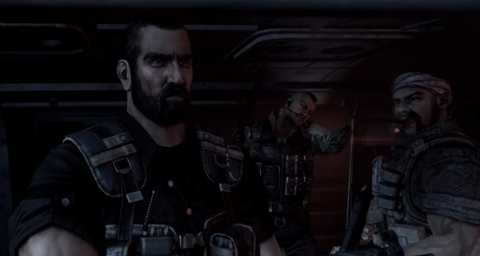
I have to assume he and his men had some way of getting to the ground alive even though it's very clear none of them were wearing parachutes, because in the next scene they're silently walking through an incredibly crude forest whose trees and grass look like the cardboard scenery produced for an elementary school play. Dick then makes some hand signals to his two companions which, judging by the general tenor of the game, mean something incredibly obscene, but they take it to mean 'kill those guys', which they proceed to do.

Not only are Richard 'Extra Chewy' Marcinko's two subordinates not given any lines, they do not even issue the perfunctory grunts of effort we've come to expect from voiced video games as they proceed to kill four North Korean soldiers, one of whom is an officer in full uniform. It's not explained why there are four soldiers out guarding the woods at night, or why one of them is an officer in full parade dress. Before such matters can be addressed one of the dying North Koreans pulls a pin on a grenade and blows himself up along with Marcinko's two partners, thus killing the game's only black guy and leaving Dick alone behind enemy lines, condemning him to the sorry fate of having to go Full Fucking Faulkner all by his lonesome.
Dick is contacted via radio by a man who identifies himself as Peyton. The desk jockey named Travis Mayhew whom Dick identified as running this op in the opening narration is never mentioned again. (Dick refers to Peyton as 'Admiral' for the remainder of the game.) Dick doesn't tell us whether or not Peyton is a desk jockey, but the way he orders Dick to abort the mission after hearing his team is dead tells us all we need to know about his cowardice, you can practically hear the skitter of pencils as he gleefully pushes them to and fro atop the desk he shamelessly jockeys as if it were a horse or camel or some other form of domesticated pack animal instead of the inert piece of office furniture God intended it to be.
Dick/Mickey Rourke responds to Peyton's order to abort with a curt “Fuck, no!” that must be far more convincing than it sounds, because that marks the end of their conversation and the beginning of the gameplay proper, as Marcinko sneaks into the town of Unggi to rendezvous with a CIA mole who has info on new missile technology being developed.
When the game starts the first person view has a nauseating motion blur that kicks in any time Dick moves more than a few inches. I turned it off immediately, which was a relief for my stomach but a burden for my eyes, which could now see the oppressively ugly world of Rogue Warrior in all its crude, grayscale glory.
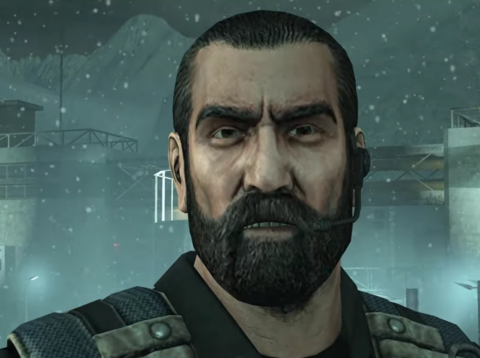
Many games have problems with character animations, but 'have' is the operative word in this instance. Rogue Warrior's character animations don't have problems, they are problems. The figures in Rogue Warrior move with a slow, syrupy glide like they're underwater, so everything happens at a quarter speed slower than it should. The most glaring example of Rogue Warrior's animation problem is that of Richard 'Ponderous Bulk' Marcinko himself. The whole point of this sorry endeavor was to build the Demo Dick brand by putting a face to the carnage, but Rogue Warrior manages to defeat the point with disturbingly crude animations. Richard 'Jamiroquai' Marcinko's face—the proverbial face of the would-be franchise—either doesn't move at all when he spouts his turgid one liners, or his entire jaw moves in one solid piece like that of a ventriloquist's dummy. It's a choice that effectively strands him at the very bottom of the uncanny valley, making it so Richard 'Ostentatious Wombat' Marcinko's appearance in the game's cutscenes fosters an impression that, unlike the impending threat of nuclear annihilation depicted in its story, is legitimately horrifying.
The enemy AI is awful, but behavior that would be merely inane on its own is rendered far worse when coupled with terrifically bad animations. There's nothing quite like watching two enemies reacting to being shot in exactly the same way at exactly the same time, as if they'd choreographed it beforehand. When enemies move between cover they do it with the eerie weightlessness of ducks in a carnival shooting gallery, their legs moving independently from their upper bodies.
Continuing the onslaught of terrible animations, there are several points in the game where Demo Dick has to 'fast rope'. I don't know why they replaced 'rappel' or 'abseil' with a term that sounds like it was coined by a four year old, but the result is that when Dick's massive slab of a body slides down the hair-thin rope it remains completely still, engendering an effect that' s more like the serene glide of an elevator than the descent of a flesh and blood human being.
That alone would be bad enough, but the enterprise is rendered even more bizarre and disturbing by the one-liner Mickey Rourke as Richard 'Turkey In The Straw' Marcinko spouts the first time he uses fast rope: “As the ex-wife used to say: if I go down, I'll get in.” As I mentioned before, the other two soldiers Demo 'Onomatopoeticist' Dick arrived with are dead, so he is for all intents and purposes talking to himself when the uses the occasion of sliding down a rope as an opportunity to remark upon how his former wife would refuse to engage in full penetrative coitus with him unless he performed cunnilingus on her first, or would at least issue declarations to that effect.
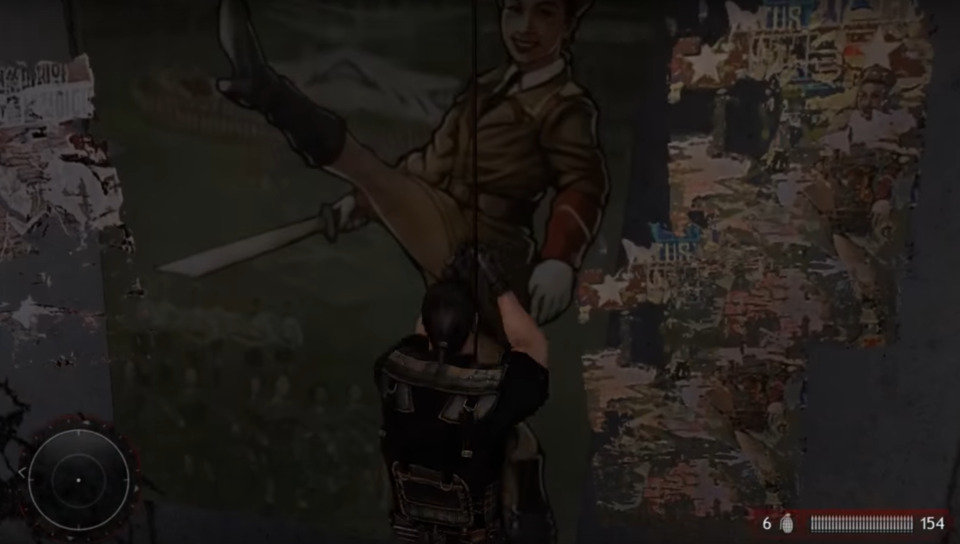
It's this sort of sentence that gives us a glimpse into the deranged musings going on in the mind that seethes behind Marcinko's dead eyes as he bathes in the blood of his enemies, yet even that is far from the most outstanding non sequitur of Demo Dick's many utterances. There's “Get dead, fuckbag!” and “Fucking retard, dead piece of shit.” and “Drop dead motherfucker, you fucking amateurs.” and even “I fucking hate hedge mazes.”, all lines slurred in Micky Rourke's trademark narcotized stupor.
However, despite the seemingly endless stream of profane hostility Richard 'Iguana Strangler' Marcinko keeps delivering to nobody over the course of Rogue Warrior, the one line that stood out the most to me wasn't an insult and wasn't a double entendre.
It wasn't even obscene.
At the beginning of the third level, when Marcinko is sneaking up on a North Korean mechanic, he says “Well, hello Francis.”
There is no one named Francis in the game.
I've given this sentence a great deal of thought. I have racked my brain to comprehend it, spent many a quiet hour turning it over in my head. I have neglected my career and alienated my loved ones and jeopardized my mental health in my crazed, Ahab-like quest to comprehend this three word enigma, and I think I've finally solved it.
I think Francis is the name of Dick's ex-wife. I think Rogue Warrior is the story of an angry man who's wandering around North Korea and Russia pretending every man he kills is his ex-wife, the woman who left him despite all the oral sex he provided, probably for a man who said “The Soviet fucking Union can fondle my hairy nut.” less often, a man who I can only presume was still in possession of both his testicles, hirsute or no.

When the writers and Mickey Rourke were crafting Demo Dick's personality for Rogue Warrior they were apparently aiming for guff but lovable. They missed. The Shark Man of the Delta as portrayed in the Rogue Warrior video game is not gruff but lovable. He is not even gruff but gruff. His personality is a black sucking chest wound of human misery, and I don't mean that in a good way. In Rogue Warrior Demo Dick has the attitude of a skeevy middle aged biker who's finally managed to get drunk enough to believe he's earthy instead of tasteless, and charming instead of repulsive. He thinks he's like the suave character Tom Cruise portrays in his movies, but in reality he's more like Tom Cruise the person: insecure, disturbing, and insane by any reasonable standard. In the end it's for the best that Marcinko's teammates were killed in the opening cinematic, since he would have ultimately ended up seeing some aspect of his ex-wife in them and killing them as well, no doubt remarking upon his hairy nut as he did so.
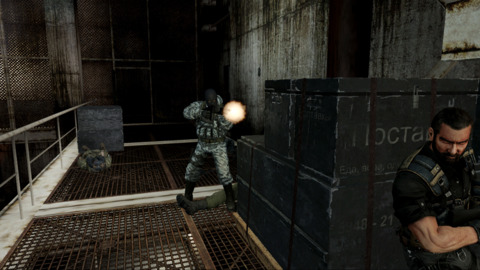
As I shambled through Rogue Warrior it occurred to me if I were watching these events unfold in a movie instead of a video game I'd be rooting for the people trying to kill Marcinko, the North Koreans and Russians who are ostensibly the bad guys. Sure, according to Rogue Warrior's paper-thin plot if Demo Dick wasn't around to stop them the USSR would have itself some fancy new missiles, but it was on its last legs in 1986 anyway. If that were the price for shutting Mickey Rourke as Richard 'Gunk Goof' Marcinko up for good, I'd gladly pay it. The only reason the game is even set in 1986 is to reassure the player that Russians are still communists, and therefore okay to kill en masse when Marcinko follows the missiles-cum-macguffins over the North Korean border, though I get the feeling Demo Dick would've maintained his killing spree undeterred if the missiles had instead gone to China, or South Korea, or Cleveland.
Still, it's important to remember that, putting aside all its talk of fuckbags, goat-fucks, and fucking hedge mazes, Rogue Warrior is still, on its own merits, a godawful video game.
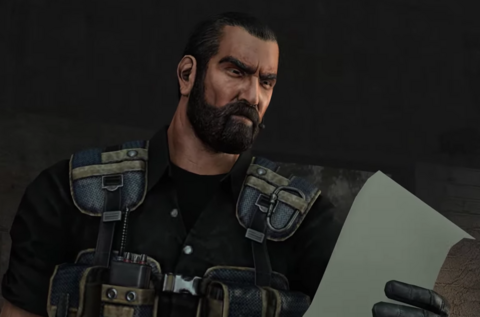
The mechanics in Rogue Warrior are crap. There is no close-up melee move, which I thought was standard issue, even in 2009 when it was released. Every close-up attack triggers a kill animation that involves stabbing the enemy in the brain, cutting their throat, breaking their neck, pushing them over a high ledge, slamming their head against a wall, shooting them with their own gun, or just punching them so hard that they die. The perspective switches from first to third person when Marcinko moves into cover, so you can watch his face either not move or move very poorly when he says something hateful. He automatically stops reloading when he moves in or out of cover, which is incredibly annoying. When he's moving in cover along a wall and reaches a window he stops moving instead of crouching under it. He can't aim downwards while in cover, so you're screwed if you're above an enemy, though the difficulty (at least on the 'Bring it on motherfucker.' setting) is low enough that it doesn't make much difference either way. There are never more than a handful of enemies on-screen at any time, and parts of some levels are eerily empty, as if the programmers just forgot to include bad guys. The game is supposed to offer the player a choice between stealth and run & gun tactics, but in practice the mechanics are so bad there's no tangible difference. The game tells you to shoot fuse boxes so the lights go out, thus 'confusing' your enemies so you can don your night vision goggles to give yourself an edge, yet shooting the fuse box prompts Marcinko to say “Chew on this, fuckhead.”, which defeats the point of being sneaky, or at least it would if the AI were less terrible. Also, it doesn't 'confuse' enemies so much as prompt them to just stand still, which I suspect they would've done anyway. If you shoot a fire extinguisher it will spit obfuscating white gas, but enemies will hit you when you move out of cover anyway. Enemies keep talking calmly to one another as they're gunned down. Cover sometimes just doesn't work, as does aiming down the sights. Shotguns are worse than useless. The Russians keep yelling “attackoo” again and again, which I am 99% sure is not Russian for “attack”. One guy was wearing a welding mask in a library for no reason. The game contains some of the worst looking fire I have ever seen, it resembles oozing orange lard. The whole enterprise is either disappointingly or mercifully short depending on your perspective, clocking in at about two hours, though it sure feels longer.
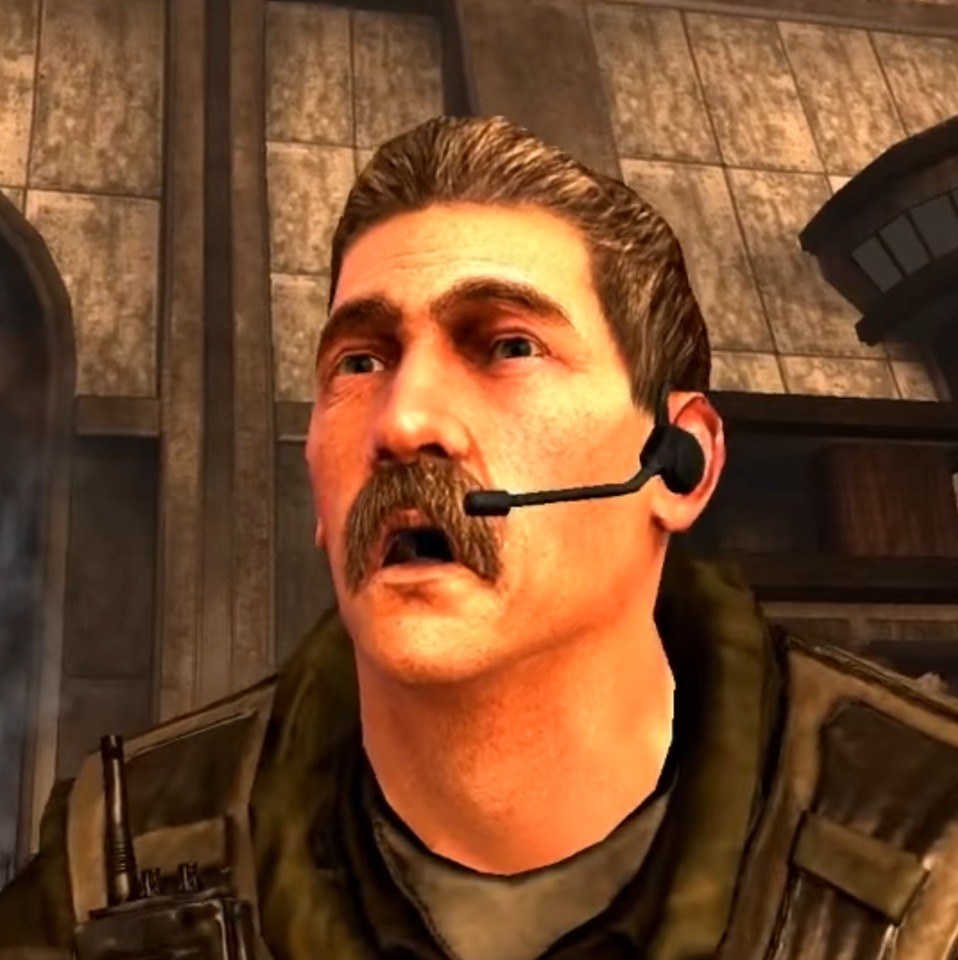
The game ends with Richard 'Garfield and Friends' Marcinko running away as something explodes behind him, then getting picked up in a very tiny boat by his allies, after which they all proceed to sail off into a hideous sunset. It's difficult to order the details in my mind, since half the cutscenes in the game consist of Demo Dick running away from stuff before, during, or after it explodes, and the instances tend to blur together in a haze of vomitous orange after effects. Finishing Rogue Warrior is in fact remarkably similar to the effect of vomiting, leaving you with a sense of profound disgust at what you just went through, mingled with weary relief at having finally purged yourself of something onerous.
Yet, continuing the analogy, you are left with a nagging curiosity of how these circumstances came to be, how it could have possibly come to this. How did events combine to create something so toxic it could pervert the very course of nature, whether it's forcing your gastrointestinal tract to violently reverse itself, or creating the monument to awfulness that is the Rogue Warrior video game? Even though the damage is already done, you need answers, you crave them, if only so you're better equipped to avoid such nightmarish consequences in the future.
In order to understand how publisher Bethesda came to the conclusion that developing a Rogue Warrior video game starring Richard 'The Jamie Kennedy Experiment' Marcinko made sense, we're going to have to trace the origins of the Rogue Warrior brand Demo Dick created, the brand that proved to be so seductive to Bethesda in the first place.
In order to address that, we're going to have to go back and take a look at the most important organization Richard 'Oshkosh B'gosh' Marcinko commanded over the course of his military career.
I'm not talking about SEAL Team Six.
I'm talking about Red Cell.
WE USED TO MAKE IT FUN
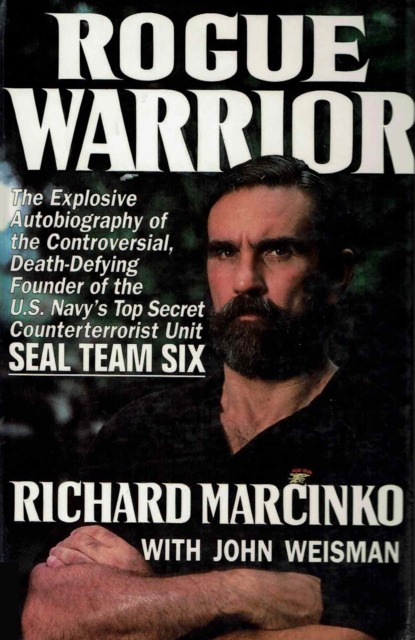
It's possible to draw a straight line that begins with Red Cell's activities, cuts through Richard 'Artful Dodger' Marcinko's subsequent imprisonment, the publication of his memoir Rogue Warrior, and the growth of Rogue Warrior and Demo Dick as a brand, a causal chain that ultimately leads to the creation of Bethesda's Rogue Warrior video game.
However, one of the worst sources for Red Cell's actual activities is Richard 'Clamgarden' Marcinko's memoir—which, to quote one Bart Simpson, is self-serving, with many glaring omissions.
I made a good faith effort to read Richard 'Seahorse Fondler' Marcinko's autobiography in it's entirety, but it's the kind of book it's hard to imagine anyone literate actually enjoying. Demo Dick hates everyone who doesn't work as hard as he does, and as a result he despises the entire world. The only exception are the men under his command, whom he loves because he gets to treat them as bad as humanly possible. His is not tough love, it is sadistic love. Richard 'Down to Frown' Marcinko is incapable of loving anything he has not taken absolute control of, destroyed, and reshaped in his own image. His only joy is the joy of a boot stamping on a human face, and repeatedly saying the word 'assfuck' while it does so. As a result I confined my reading to the book's prologue and the final third documenting the activities of SEAL Team Six and Red Cell, while skimming the remainder.
Conversely, the best source of information I could find on the factual activities of Red Cell is a 1994 documentary uploaded to YouTube entitled Red Cell: The True Story. The very fact that the documentary has been digitally preserved is a minor miracle unto itself, thanks to uploader DeafRoweTV just happening to find a VHS copy in a local thrift store.
The original provenance of the video is something of a mystery. According to the credits it is a L.O.T.I. Group Production, a Google search of which yields little beyond the information that it produced several videos related to the Navy SEALs from the 1990s to the 2000s, including documentaries and instructional videos which, if the covers displayed on Amazon.com are anything to go by, are amusingly low-budget affairs.

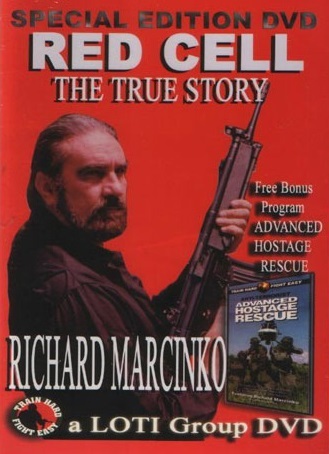
Regardless of its humble origins and cheesy Video Toaster scene transitions, Red Cell: The True Story yields a valuable trove of information taken directly from Richard 'One Love' Marcinko and his various cohorts, who detail their activities with verve, gusto, and astonishing shamelessness.
The Red Cell program that began in 1984 and would eventually go on to implode after the kidnapping and torture of Ronald Sheridan began with an order from then-Three Star Admiral Ace Lyons, Deputy Chief of Naval Operations. He issued the command to create Red Cell to Richard 'Cheesebeard' Marcinko, who had just one year prior been forcefully squeezed out of command of SEAL Team Six because, to put it bluntly, the vast majority of Navy officialdom loathed him. He loathed them right back, and with the legal impunity offered him by Red Cell's mandate to test the security of U.S. Naval bases the world over, he determined to do as much as he possibly could to publicly humiliate the officers in command.
Broadly speaking, Red Cell's endeavors went something like this: Richard 'Dunk Tank' Marcinko and his hand picked team (all former SEALs save one) would perform reconnaissance on a base, identify its weaknesses, then inform base command via telephone they were going to break in, identifying themselves as 'The Movement for the Free Ejaculation of Palestine' which, as far as jokes go, is close enough for government work. Red Cell would then infiltrate the base by scaling fences, cutting locks, using fake identification and disguises, or in one case even slipping in where a neglected fence had rotted away to almost nothing. Once inside they would plant fake bombs in the form of smoke grenades, steal weapons or intelligence, then make good their escape, with everything they'd done captured by videographers in the employ of Red Cell to provide irrefutable proof of what they'd accomplished.

Red Cell did achieve incredible things, exposing massive gaps in American military security by highlighting the overwhelming abundance of human error baked into the system, the sort of carelessness that persists no matter how technologically advanced any security system is. For example, Red Cell was able to subvert a microwave-based motion detection security system surrounding a base hosting Air Force One by hurling multiple cats, dogs, and rabbits over the security fence, triggering so many false alarms that security personnel decided the system was broken and turned it off, at which point Red Cell was free to advance to the plane and even blow it up, had they so pleased.
There was a decidedly festive atmosphere to the proceedings, a gleeful mischief on Red Cell's part reminiscent of teenagers getting away with acts of petty vandalism. It wasn't just an exercise for them, but an opportunity to release all the pent-up aggression they'd accumulated over the course of four years of mind-bogglingly intense training to combat an enemy who stubbornly refused to materialize. According to John Weisman, the co-author of Marcinko's books and one of the talking heads in the Red Cell: The True Story documentary:
“...and then you have a whole bunch of people at SEAL Team Six who have been training and training and training and training and training and training since 1980 and never really allowed to do the job that they wanted to do.”
It's important to distinguish here between the job they were officially tasked with, and, as Weisman puts it in the documentary, the job they wanted to do. Ace Lyons, the Admiral who ordered the formation of Red Cell, put it this way in Marcinko's memoir:
“The idea, is not that you assholes shoot and loot like a bunch of crazies. The idea is that we teach the Navy how to make life difficult for terrorists.”
It was an idea Marcinko would discard as the Red Cell Torture Program was born, a term of my own invention that I'm going to use in order to distinguish Red Cell's legitimate activities testing base security from its systematic campaign of human rights violations.
Given what Richard 'Feisty Feline' Marcinko's attitude was going into the Red Cell program, it was inevitable that he was going to take things too far. As he described his mission:
"I'd tell them Red Cell was coming, eat them alive, and then show the film and rub their noses in it."
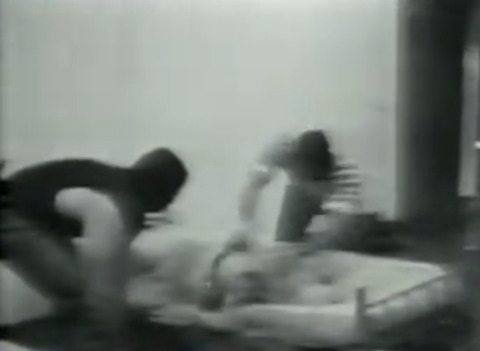
And rub their noses in it he did. Indeed, if terrorism is really 'Performance Violence' as defined by Mark Juergensmeyer, professor of sociology at UC Santa Barbara, than what Red Cell did was Performative, Dick Waggling, Nanny Nanny Boo Boo Violence, where the explicit goal was inducing terror and humiliation and shame with the members of Red Cell flouting their impunity all the while, be it from legal reprisal or official Navy grooming standards.
Red Cell's remit extended to simulating hostage situations where the base's staff was obliged to play along, pretending Red Cell's guns were loaded and their threats were real.
And that's where it should have stopped. Once the base was been penetrated, security compromised, and the taking of hostages simulated, the point was made and Red Cell's mission was accomplished. At that point they had no reason to do anything but wait for other special forces teams to attempt a simulated hostage rescue. As for why the members of Red Cell then proceeded to inflict real torture on people who were supposed to be in pretend captivity... well, as the much-lauded playwright Harold Pinter said in his Nobel Prize acceptance speech: torturers are easily bored.
So they took hostages and hurled them against walls, hit them (the amount of force put into each blow seems to have been determined by whatever struck a Red Cell operative's fancy in the moment), shook them, tackled them, pinned them, hurled them into burning or freezing showers, bellowed abuse at them, forced them into stress positions, and stuffed their heads in toilets, though by far their most favored tactic was sadistic mind games. In the Red Cell: The True Story documentary, Richard Marcinko uses the word “teasing” to refer to the activities of the Red Cell Torture Program. He goes on to say:
“One of the weak links that American guys have is stripping them and giving them a hard time about their penis to say how small it is how inadequate they are and it [sic] just they curl up.”
I'm willing to go out on a limb and say that violently abducting someone, ripping their clothes off, and mocking their genitals is a weak point for pretty much everyone. What was the goal of this? To demonstrate that Navy soldiers were insufficiently proud of their glorious American penises? What would the solution be? Having an intense, rigorous, penile self-esteem course integrated into basic training? Are the Russians threatening to eclipse us in anatomical shamelessness?
Waterboarding hostages was routine. As Marcinko puts it: “We did the drowning.” The reason Marcinko gives for doing this is “just to bring them around the idea of what could happen to them.”
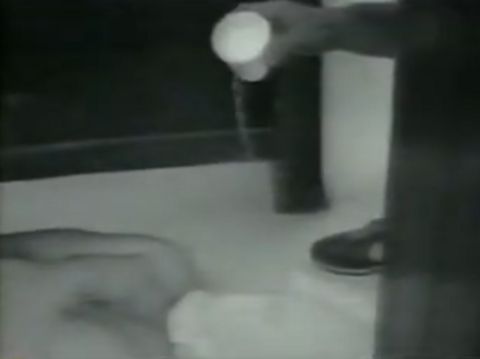
Regarding the Red Cell Torture Program, Marcinko says the following, which I have edited for the sake of readability:
“You know, did we play too rough? Nowhere as near as the bad guys are going to. You get into the realism of what's going on, and so the juices flow. Even with me knowing what's going on, I get carried away at times. So does it happen to anybody? Yeah. Both sides. Your saliva account [sic, maybe?] gets up and people get emotional. People get tired and things happen. Shit happens.”[3]
Again, Marcinko's 1992 memoir Rogue Warrior and his January 4, 2010 website make no mention of the Red Cell Torture Program. His candor in the 1994 documentary may be due to the fact that the news program 60 Minutes did a segment on Red Cell's activities in 1992 in which they broadcast footage of the videos Red Cell had made of their activities, including footage of the torture of Ronald Sheridan. However, in the documentary, as in every other aspect of his life, Marcinko expresses no remorse whatsoever, refusing to admit he even has the capacity for self-doubt. In my estimate the more likely reason for Marcinko's candor in the documentary is that he was simply placed in front of the camera and allowed to speak freely, with no ghost writer or public relations manager around to tell him “Don't talk about how you tortured your fellow soldiers, and if you do, try not to sound so proud of it.” He also uses it as a promotional opportunity, as evidenced by the fact that he's wearing a t-shirt advertising his latest book for the duration of the interview.
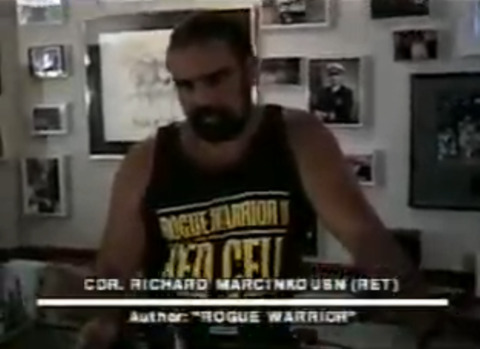
Its title is Rogue Warrior 2: Red Cell.
To further convey the attitude of Red Cell, here's a quote from former member Steve Hartman from the same documentary—again, edited for readability:
“Oh we had a ball. We had a blast. It was a lot of fun. It was great. We used to make it fun. We had a lot of fun, I mean, it was enjoyable. It was a great job. The psychological effect of it is the initial shock at three o'clock in the morning. In the barracks, you get woken up by a guy in a black hood, screaming in your face, dragging you out of bed. You have no idea what's going on, initially. That sets the clock running. Now you have them, you know. And on top of that, people knew that this was a SEAL organization, so automatically the reputation comes into play. 'It's SEALs, don't piss them off, they'll kill you, you know.' So, I mean, it was a lot of fun. You could have a ball with it. Get angry, mad, treat them like a hostage, then go into the bathroom and laugh at it. Treat 'em just like a hostage, and then when you're off with the rest of the team, you just started laughing about it. I mean, the way some people react is very humorous. The old adage of work hard, play hard doesn't apply anymore in the military, it's not the thing to do anymore. But when you ask somebody to go out and get their ass shot off, or jump out of airplanes at 28,000 feet, if you then expect them to come home and play goody two shoes, it's the wrong answer. You need to let them unwind somehow. And that's not by playing tiddlywinks. ”[4]
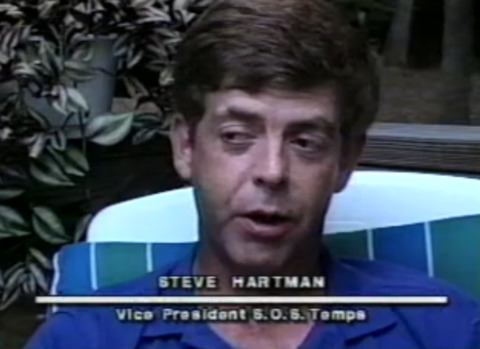
To review, Richard Marcinko considers torture to be teasing, while his compatriot Steve Hartman thinks of it as unwinding. Either way, it's obvious that they both consider what they did to have been recreational, a sort of elaborate prank committed by violent but whimsical schoolboys whose only real crime is fanning a spark of adolescent mischief. It's an attitude exemplified in Red Cell's torture of Ronald Sheridan, during which, in between beatings, they dunked his head in a toilet and flushed it, giving him a swirly. The reason why this happened seems to be that the members of Red Cell who were present found the savage beating they were giving him insufficiently entertaining for themselves, and insufficiently humiliating for Ronald Sheridan.
In his memoir Richard Marcinko presents both the downfall of Red Cell and his subsequent imprisonment as conspiracies against him waged by the Navy's upper command structure, who were intent on persecuting him. The former claim is possible but questionable, while the second is obviously true.
A lawyer in the employ of the Navy accompanied Red Cell on their various escapades into Naval bases to make sure what they did remained within the bounds of legality, if not basic human decency. (At one point in the documentary Marcinko says “The lawyer was a spy.”, but he doesn't elaborate, and it's impossible to tell what precisely he means.) However, just prior to the kidnapping of Ronald Sheridan, their usual lawyer was swapped out for someone else. This was also when Ace Lyons, the Admiral who had originally ordered the formation of Red Cell, was promoted into another position and the role of overseeing Marcinko and his underlings was transferred to Vice Admiral Donald Jones.
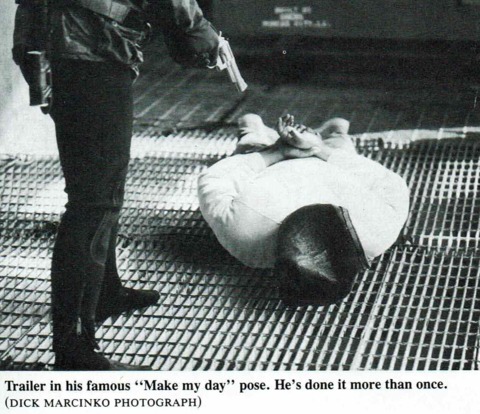
If intentionally removing such friendly supervision was a trap, it was one Red Cell instantly rushed headlong into since, according to the documentary, the kidnapping and torture of Ronald Sheridan took place one day after Admiral Ace Lyons was replaced with Donald Jones.
On first blush it seems like the prospect of the Red Cell going too far the very moment the lawyer and commanding officer protecting them were taken away is ridiculous. However, the more I learn about Red Cell and its members's irrepressible enthusiasm for torture, the more it seems like they were always hell bent on hanging themselves, the only question was when the powers that be would finally give them enough rope to do so.
The political motivation of Richard 'Ramblin' Dumpster' Marcinko's prosecution and imprisonment is much more obvious. Despite the civil suit Ronald Sheridan filed against the government, Richard 'Chocolate Rain' Marcinko was not prosecuted for any of the human rights violations he or the men under his command committed during their Red Cell heyday. Instead Marcinko was indicted for conspiracy, conflict of interest and lying to the government on July 13, 1989, three years after the kidnapping of Ronald Sheridan. He was acquitted of the charges, but the government kept coming after him, leveling further charges against him until he was convicted of conspiracy to defraud the government on January 24, 1990. On March 9, 1990, Marcinko was sentenced to 21 months in federal prison and fined $10,000 for the crime of—to put it in layman's terms—paying too much money for an order of hand grenades.
Imprisoning Richard Marcinko for the crime of misappropriating funds was akin to nailing Al Capone for tax evasion. Richard Marcinko and the men under his command were guilty of assault, unlawful detention, kidnapping, torture, and actual, factual terrorism, acts Marcinko committed with such eager impunity he literally had his men videotape their crimes for posterity, lest anyone get the wrong impression that Red Cell wasn't inflicting real grievous bodily and mental harm on innocent people.
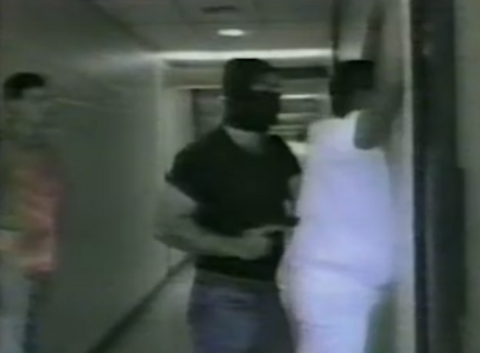
Someone had to be punished for this. If not, it would have set a precedent that implied it was in fact legal for Special Forces soldiers to commit acts of terror against fellow Americans under the pretense of testing national security. Given the fact that every military organization is by nature riven with petty grievances and endless squabbles that range from battles over funding to which soldier gets to wear what kind of hat during what kind of formal occasion, it's easy to imagine a scenario where grudges spiral out of control and different sub-branches and sub-sub-branches of the military are conducting ego-driven tit for tat raids against one another, all under the convenient guise of 'Testing National Security'.
This kind of shit can't be tolerated. Marcinko and his various ideological cohorts like to paint Red Cell as a victim of its own success, which is partially true in a political sense, but also a lie by omission. Red Cell was a victim of its own brutality, though even that is to state their case too generously, since Richard 'Jim from The Office' Marcinko was convicted in a court of law and punished in a manner that didn't violate his basic human rights, which is a degree of leniency none of Red Cell's victims were ever granted. Red Cell had to be stopped, not only because its activities were dangerous and sadistic, but because there are other, better ways to test military security, ways that don't involve scarring innocent people for life.

Of course, if Richard 'Finger Puller' Marcinko's punishment was intended to be an indictment of torture as practiced by the United States military and its various subsidiaries, it fell on deaf ears. The photos that came out of Abu Ghraib prison in 2004 depicting the torture of Iraqi prisoners is proof enough of that. Perhaps if the Red Cell Torture Program had been subjected to more public scrutiny, the world would not have been so shocked. After all, what was going on in Abu Ghraib wasn't unique. The United States Navy was doing it to itself in the 1980's.
By then, Richard 'Bohemian Bigfoot' Marcinko had long since moved beyond any fear of reprisal, having elevated himself to the status of living legend with his prison memoir and its many fictional sequels.
Demo Dick did not invent the idea of the celebrity soldier, (after all, the oldest written story known to humanity is the tale of the great warrior king Gilgamesh) rather he reinvented it.
In many ways America, or a least a significant subsection of it, was being primed to embrace a character like Richard “Tea With Lemon” Marcinko over the course of the 1980's; which, let us not forget, was the golden age of the swaggering musclebound action hero who bucked the system and played by their own rules, a time when Sylvester Stallone and Jean-Claude Van Damme were the most bankable stars in Hollywood, and even dead-eyed charisma voids such as Charles Bronson and Chuck Norris could be leading men as long as they indiscriminately blew away enough street trash. The USA's military failures weren't just being brushed off, history was being rewritten, with Sylvester Stallone returning to Vietnam to win the war for real this time in the confusingly titled Rambo: First Blood Part 2, and Chuck Norris portraying United States special forces operatives as invincible death dealers who unfailingly save hostages, kill vaguely ethnic people, and disobey orders from cowardly superiors telling them to moderate their violence.
That changed in the 1990's, which were inaugurated with Arnold Schwarzenegger donning the mantle of Kindergarten Cop. The Soviet menace was no more, America's biggest rock stars were ardent proponents of feminism and gay rights, Bob Hope had apologized for his joke about the Statue of Liberty having AIDS, and a Democrat was in the white house for the first time in twelve years. (He would eventually prove to be even more conservative than his predecessors in many ways, but that's a polemic for another time.) By 1992 the conservative backlash was already brewing to the perceived wussification of America. It was the sort of environment where all Richard 'Laser Bone' Marcinko had to do was raise his hand and proclaim 'I really was the renegade action hero others only dream of being.'

If Richard 'Hampocalypse' Marcinko's hateful personality pushed him out of the political mainstream, it only served to solidify his position on the far right fringe (or at least what qualified as such at the time) where he staked his claim as the iconoclast who reveled in his military accomplishments and refused to apologize for America being so gosh darn awesome. It didn't matter that the wars in Vietnam and Cambodia he participated in were tragic fiascoes, it didn't matter that the SEAL team he commanded never participated in a real mission, it didn't matter that when he was finally given the freedom to do whatever he wanted with Red Cell he'd used his authority to viciously torture fellow soldiers—refusing to show contrition or even question the nature of his actions was part of what made him so exceptional. Not apologizing was a defining trait of the Rogue Warrior brand, and Richard 'Nut Meat' Marcinko was never one to let truth get in the way of a good story.
It didn't matter if mainstream success eluded Demo Dick, popular culture found other ways to fondle his hairy nut, and he worked as a military consultant for the movies G.I. Jane and The Rock, as well as the TV show 24. After the 9/11 attacks his reputation only grew as he was framed as the maverick who tirelessly advocated for counterterrorism before it was cool to do so. His website would identify him as president of Richard Marcinko Incorporated and SOS Temps Incorporated, a spokesman for Zodiac Boats Maritime Training Academy and Oakley Sunglasses, a designer for Strider Knives, the chairman of private security firm Red Cell International Corporation, and a radio host.
When Bethesda announced they were adapting the Rogue Warrior intellectual property as a video game in 2006, he must've seemed poised to take over the world, while people like Ronald Sheridan were consigned to the dustbin of history.
It certainly wouldn't turn out to be so infamously awful it would eclipse its source material, becoming the first thing that comes up when one Googles 'Rogue Warrior'.
Right?
PERSONALITY SHOOTER
A brief reminder of the kind of man Richard 'Nighttime Nubbin' Marcinko is. This incident is taken directly from his memoir:
In Rogue Warrior, he documents how a man he identifies as Donnie Lee was injured in the course of SEAL training. They were practicing room-clearing, and when the door was breached the man behind Lee stumbled and shot him in the back. Demo Dick insisted on using live rounds during training exercises, saying there was no substitute for the real thing. Lee was hospitalized and, after two operations, developed a staph infection. He fell into a coma. Here's Demo Dick's own account of how he dealt with the situation.
“Every day, I'd spend a couple of hours at the hospital, watching the kid on his respirator. I took to yelling at him. 'Get the fuck up, Donnie,' I'd shout.”
Donnie did not get the fuck up. Donnie died. Marcinko reacted to this with his usual, circumspect aplomb.
“Donnie's death didn't interrupt the pace or intensity of our training schedule. I couldn't allow it to. In the real world you don't stop and suck your thumb and talk and talk and talk. Not when there's a mission in front of you. All those Hollywood movies where some kid dies in training and his best friend goes into a funk and can't fly (Top Gun comes to mind) or do his job are utter bullshit.”
Donnie Lee's mother was there to watch her son die in spite of Marcinko's periodic scream-therapy. Marcinko refused to tell her how Donnie got shot, saying the information was classified. If she ever found out the true circumstances of her son's death, she did by reading Marcinko's explosive best selling autobiography.
Needless to say, Marcinko's policy of using live rounds during room-clearing training did not change.
This was the man embraced by Hollywood as a military advisor, who Oakley Sunglasses chose as their spokesman, who Strider Knives commissioned to design a series of blades, and who Bethesda chose as the ideal subject of their video game.
The Bethesda of 2006 was not the titan we know today. Though Elder Scrolls 4: Oblivion had been released to much acclaim, Bethesda was still struggling to establish its identity, and deliberately trying to cultivate an edgy image. This was also around the time they published a video game about a sexy lady assassin called Wet—as in wetwork, i.e. killing—which is probably the only major triple-A video game ever released whose name is a reference to both murder and the state of an aroused vagina. (Please post corrections in the comments below.)

At the beginning of 2006 there had been fifteen games published with Tom Clancy's name in the title, a name that was already beginning to surpass its association with any individual person and transform into a brand unto itself, similar to what Madden is to American Football games, what Sid Meier is to Simulation games, and what Hideo Kojima is to whatever the hell a Strand game is. In retrospect it's easy to see how Bethesda thought Richard 'Cream of Wheat' Marcinko's Rogue Warrior brand could prove to be just as lucrative. At the time the Tom Clancy name stood for military games that were grounded in reality and exercised a certain degree of restraint in just how flamboyant their violence could get, doling out their killing to the player in measured doses that at least seemed a bit more sensible than the bottomless carnage of your average Doom clone.
Rogue Warrior was supposed to be the Mortal Kombat to Tom Clancy's Street Fighter: a similar concept delivered in a much more audacious, unrepentantly violent package. Rogue Warrior could, at least in theory, deliver the same kind of realism a Tom Clancy property could with Richard 'Pocket Fisherman' Marcinko bringing his military expertise to the project, but with intense run and gun gameplay more befitting an arcade shooter than the staid, tactical gunplay of a game like Tom Clancy's Rainbow Six. The elevator pitch of “Tom Clancy realism with Doom gameplay.” practically writes itself. What could go wrong?
As it turns out, virtually everything.
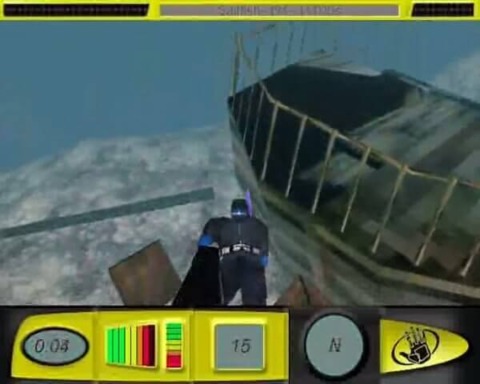
Publisher Bethesda announced their licensing of Richard 'Slap Happy Rhythm Buster' Marcinko's Rogue Warrior brand in 2006. They contracted Zombie Studios to develop it, a company that had been producing military shooters of... varying quality since 1994 along with several licensed titles. Among other things they made the 1999 underwater spearfishing game Body Glove's Bluewater Hunter, which, as far as I know, is the only major video game ever commissioned by a swimwear company. (Corrections. Comments. Below. You know the drill.) The projected release date for Rogue Warrior was 2007.
Bethesda then remained silent on the topic of Rogue Warrior until April of 2009, when it announced it had dissolved its relationship with Zombie Studios, scrapped their work, and started from scratch with the new studio Rebellion Developments. Their stated reason for this switch was, according to Bethesda Marketing VP Pete Hines:
“It needed a change in scope and a change in focus. And we felt that that was the focus that it needed. That the sort of squad-based, tactical—in a sense I guess it was turning into a bit of a Navy SEAL game, and it was less of a Dick Marcinko game. And I think we just felt like, he's this really cool personality, and that personality is in a sense getting a bit lost in the mix here. How do we pull him out, and pull his personality out more? And so changing the focus of the story and the mechanics of the game is one way. Having Mickey Rourke come in to do the [voiceover] was another. How do we really make his performance stand out and lend a voice to this character.”
It is also possible that the game produced by Zombie Studios was simply deemed too awful by Bethesda to publish. I know that must seem ridiculous given the sublime level of horribleness Bethesda ultimately proved willing to accept from new developer Rebellion. However, in addition to Rogue Warrior, I am morally obliged to confess that I have also played Zombie Studios's rail shooter Blackwater, a game that somehow, some way, manages to be even worse.
However, I'm also willing to take Bethesda Marketing VP Pete Hines at his word. Bethesda had paid for the Rogue Warrior brand and it was only natural that they wanted a game that placed Demo Dick's Demo Dickery front and center. If Zombie Studios had failed to produce anything beyond another bland military shooter like the Spec Ops games they churned out with mechanical regularity and unfailing crappiness, it's only natural that Bethesda would try to push the game in a new, more Dick-heavy direction. Aeron Guy, a Senior Producer at Rebellion Developments, said as much in an interview where he emphasized the game's fundamental Dickiness, saying
“As I said, it's based around his experiences more than the specific things he's [Marcinko] taken part in. I think it's a very strong IP[intellectual property] a very interesting IP, having a shooter based on a real guy. Hopefully, people will be interested in it. They'll get a feeling for what it was like to be him and go around those places and do things in the fashion he did.”
A novel phrase that comes up multiple times in interviews is Personality Shooter. Rebellion's Aeron Guy calls Rogue Warrior “...a really exciting, gritty, violent, personality shooter.” While Bethesda's Pete Hines calls it “A cool, personality-driven shooter.” Hines also took the unusual step of trying to lower expectations for the game's quality in advance, saying
“Every game that comes out doesn't have to be a 99. I think it's going to be a good game that does what it does well, and is true to its core experience. I think there's a big audience out there for that.”

In regard to Rogue Warrior's development, Aeron Guy says “We weren't hindered in any way. The development process is like it always is.”, however, Rebellion Developments was given just a little over a year to make Rogue Warrior from scratch, which is a ridiculously small amount of time to make a video game of any kind, let alone a major one like what Rogue Warrior aspired to be. When reading staff interviews, it quickly becomes apparent that Rogue Warrior's gameplay, graphics, music, and so on weren't expected to be stellar or even good; rather all involved in its production were leaning entirely on Demo Dick's character to carry the game, hoping his flaming Dickitude would be so entertaining as to render all other considerations irrelevant, thus their regularly invoking the unusual term 'Character Shooter' to describe it. Today when we hear the term Character Shooter we tend to think of something like Overwatch, a game featuring many colorful characters with distinct powers and appearances who have rich merchandising, cosplay, and Rule 34 potential. In 2009 Bethesda and Rebellion meant something different by Character Shooter; they meant a game where a character shoots people, a character who's so colorful, eccentric, and compelling to watch that every other aspect of the game, good or bad, ceases to matter.
They bet everything they had on Richard Marcinko.
But something changed, because Richard Marcinko isn't in their game.
The character in Rogue Warrior is a guy named only as Dick who bears a passing resemblance to Richard Marcinko and swears a lot, but that's where the similarities end. After all that talk about it being a Character Shooter, after scrapping two years of work and switching developers to better emphasize their real world inspiration's unique personality, the game Bethesda and Rebellion produced does everything it can to distance itself from the actual Richard Marcinko. The Senior Producer at Rebellion Developments stated in an interview that Marcinko was “...a very strong IP, a very interesting IP...” yet if you didn't read the back of the box, you'd never know the game is based on a real person. Even if you do know that Rogue Warrior is based on a real person, it only serves to make the front of the box more confusing.
Bethesda paid to use Richard 'Turnip Twaddler' Marcinko's likeness, but it's hidden in shadow. Bethesda paid to use Richard Marcinko's name, but it's rendered in front so small it's impossible to see unless the box is three inches from your face. Even then the name on the box isn't 'Richard Marcinko' or 'Demo Dick', it's 'Dick Marcinko', which is a variation the man himself seldom used outside his website.
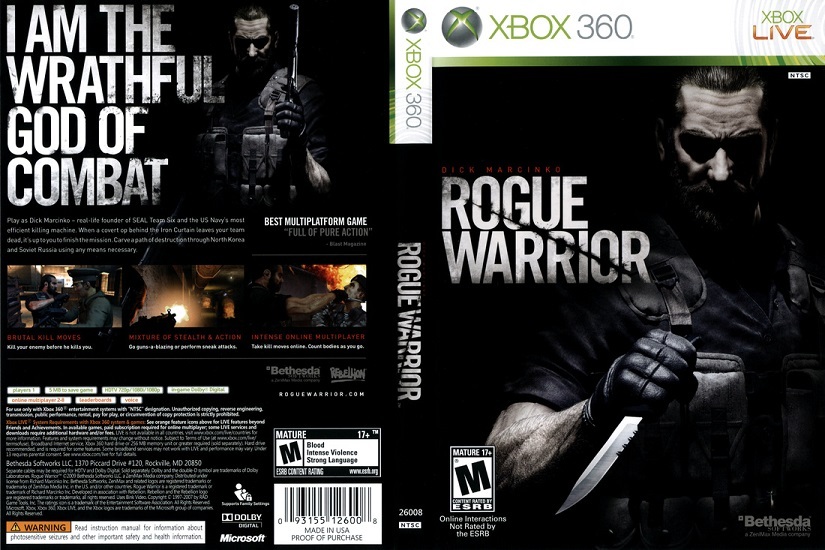
The story in the Rogue Warrior game—assuming one can be said to exist, which is itself a generous assessment—has nothing to do with any of Richard 'Delicious Fist' Marcinko's actual military experience. All his vaunted accomplishments are absent: nothing of his experiences fighting in Southeast Asia, nothing of his establishing and building SEAL Team Six, nothing of his multitude of training exercises throughout the world.
No mention of Red Cell.
No mention of the Red Cell Torture Program.
Even the counterterrorism that so distinguished him as a prescient tactician is nowhere to be found. Instead the story is the most generic cold war dreck imaginable. Rebellion and Bethesda do everything they can to turn their version of Dick into a cartoon that's too over-the-top and ludicrous to have any connection to reality which, when it comes to leveraging brand awareness, is kind of like buying the Madden NFL IP and using it to make a game about a guy named Maddy who yells at badminton games in Ecuador.
Also the athlete on the game's cover is obscured by darkness.
Also the name 'Madden NFL' is in vanishingly tiny print.
Also the real John Madden never acknowledges that the game exists.
All this seems to indicate the collaborative effort between Richard 'Kinky Wizard' Marcinko and Bethesda was intentionally scuttled, or at least obfuscated as much as possible without canceling the game outright. If this theory (and that, admittedly, is all it is) is correct and everything possible was done to minimize the game's association with the real world Richard 'Slap Chop' Marcinko, who made the call? Did Marcinko realize the game Bethesda was making about him was going to be garbage and demand that his association with it be obscured? Or did Bethesda become aware of the true moral character of the person they were depicting as a hero in their game and decide to do the absolute minimum to fulfill the letter of their contract, hoping the game they released with minimal fanfare would vanish from the public's memory like a fart in the wind?
If the former is true, it's easy to see why Bethesda would bow to Richard 'Monster Dunk' Marcinko's wishes. Marcinko has an undeniable charisma and can be extremely charming right up to the instant you stop giving him what he wants, at which point a switch is flipped. In the documentary Red Cell: The True Story he threatens the woman who's interviewing him so casually he doesn't even seem to notice he's doing it when, speaking about how how Red Cell would torment female captives, he says
“The easiest way to get a female candidate to snap, and you'd be a good candidate, is play with their hair. We'd blindfold them and put their head into a sink and run water and snip scissors.”

The 'you' in question is the woman interviewing him. Richard 'Mind Cavity' Marcinko is able to get away with such utterances because he speaks very quickly and is constantly leapfrogging from topic to topic. This method is popular among cult leaders, who like to introduce their more radical ideas by sprinkling them in among more acceptable ones, so that by the time you realize someone has implied that punishing people via starvation is a good thing they've already reverted to soothing platitudes about peace and love that any right-thinking person must agree with, while having successfully planted the seeds of dangerous ideas that can be nurtured and harvested later. By this same method Marcinko is able to insert a threat into normal conversation, and by the time someone has realized they've been threatened he's three topics away and ensconced in a soothing layer of plausible deniability. Using rhetorical tricks like this allow people to see what they want to see, and two people can leave the same meeting with completely different impressions of a person, all of which I say to illustrate how, if Richard 'Bumbleboobie' Marcinko wanted to distance himself from the Rogue Warrior game as much as legally possible, he had ways of imposing his will that the average Bethesda manager wasn't equipped to counter.
Alternately, Bethesda could have been the ones to pull the plug. Admittedly, I have much more easy access to information today than even an entire company like Bethesda would have had back in 2006 when they inked the deal to license the Rogue Warrior IP. Now I can simply search 'Red Cell' on YouTube and gain access to an obscure documentary containing candid information on the Red Cell Torture Program, and even then I never would've found out about it if I hadn't known what to look for.
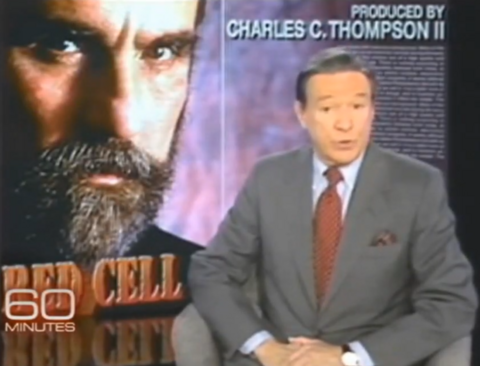
Yes, 60 Minutes did a news segment featuring footage of the Red Cell Torture Program in 1992, but such a thing would have been very difficult to find in 2006, even if you knew it existed. According to developer Aeron Guy, Rebellion met with Richard 'Ratatouille' Marcinko three times. Publisher Bethesda probably interacted with him to a significantly greater degree over the course of Rogue Warrior's three year development cycle, over which time the true nature of Marcinko's personality would've become increasingly apparent. Still, it would've taken very little effort on anyone's part to realize what kind of man Demo Dick truly was, before or after the deal was made. Random skimming of his 1992 memoir, which let us not forget the damn video game is named after, reveals standout jewels such as
“We learned about intelligence, and what to look for. At first we left some of the VC's[Viet Cong's] personal stuff behind. Now I realized it was important source material, and we took everything we could get our hands on. Forget all those TV-movie scenes of the grunt who finds the picture of the dead VC's kids and wife and goes to sentimental pieces as he realizes he's just killed a fellow human being. Scenes like that are probably written by people who've never had shots fired at them in anger. Fact is, Comrade Victor Charlie wanted us dead, deader, deadest. And if taking a cute snapshot or a letter from a VC corpse somehow helped us in the effort to get him first, then too bad for Mr. Charlie, Mrs. Charlie, and all the little Charlies.”
Even Mickey Rourke, halfheartedly slurring obscenities in a sound booth, knows enough not to wish evil on the children of his enemies.
This is what examining the real Richard Marcinko does to your brain. It leaves you admiring the dignified restraint of Mickey Rourke in confining himself to comments like: “Fuck your mother fuck your father fuck 'em in in the ass cocksucker you fucking asshole.”
Another excerpt:
“I couldn't stop smiling. We'd shot off every frigging bullet we'd carried with us, and we stunk of cordite and sweat. We smelled like the warriors we'd always wanted to be. War was great!”
War was great.
To hell with “FULL OF PURE ACTION”, put that quote on the box.

Bethesda wanted Marcinko to serve them up real, gritty, true to life, on the ground war. It was probably only when they actually got it that Bethesda realized just what a colossal a mistake they'd made, that there was a good reason why Tom Clancy's version of authentic war was so restrained and sterile. Real war is a living nightmare, and the people who derive recreational pleasure from it tend not to have the best moral compass. Most people who are subjected to the horrors of war spend the rest of their lives trying to regain the humanity that was violently ripped away from them, but there are exceptions, people who revel in war, who even after the war has ended seek to cling to the mentality that sustained them, applying it to whatever they can. Sometimes people locked in such a twisted mindset are able to get the help they need and readjust to life during peacetime—and, alternately, some people are having too much fun to get better.
I concede I might be assuming too much about all this. It's possible that the reasons for the bizarrely Marcinkoless version of Rogue Warrior that finally reached the public in the dumping ground of December 1st 2009 are far more mundane, the product of arcane legal or financial circumstances I'll never be privy to. I'm naturally prejudiced by my hope that publisher Bethesda and developer Rebellion learned the truth about Richard 'Angelfire' Marcinko and, well, rebelled, intentionally subverting their glamorization of a person they belatedly realized was a depraved sadist; but it's entirely possible I'm giving them too much credit, and Rogue Warrior was just one C-Tier game among many that were halfheartedly crapped out into a market rife with such turgid garbage. Today the video game market is still full to bursting with similar tossed-off crap, the only difference being that now developers are free to entice players with actual, literal goat fucking, instead of only referencing such activity by way of a dry rhetorical flourish.
Whatever its mysterious, convoluted origin, the Rogue Warrior game still stands as a living monument to pretty much every mistake it's possible to make when creating a video game, and its horrible graphics, horrible gameplay, horrible acting, and horrible story all pale in comparison to the monumentally awful decision to make a game starring Richard 'Gorilla Glue' Marcinko in spite of everything he represents. The Rogue Warrior video game is by far the most visible and colorful instance of Marcinko being embraced by mass media and culture at large as a sage of marshal wisdom despite his crimes, but it's far from the only example. The whitewashing of Demo Dick's rabid inhumanity and the widespread acceptance of his philosophy of evangelical violence are symptoms of a larger, more far reaching phenomenon, one that continues to infest popular culture to this very day.
Indeed, with the benefit of hindsight, we can see that, as with his counterterrorism strategies, when it came to parlaying one's military service into a lucrative brand, Richard 'Joyboy' Marcinko was astoundingly ahead of his time.
THE DEMOLITION OF RICHARD MARCINKO BY THE COWARD LOSTSOL(that's me)
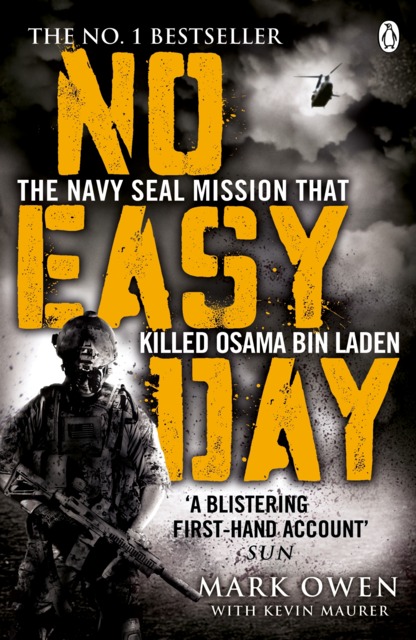
The age of the celebrity soldier is upon us. While the idea of winning fortune and glory on the battlefield is as old as war itself, changes in mass media and the way soldiers are perceived by the civilian public has created a new kind of military hero who hasn't just distinguished themselves with displays of exceptional courage but, thanks to canny media strategies and stringent public image management, become legends in their own time. There needs to be a new word for this phenomenon, a portmanteau like soldebutante, killebrity, or armfluencer.
There are many reasons for this. The radical democratization of media. The overwhelming lack of public participation in the military, which has become remote and fetishized. The fact that the military is the only remaining government institution a majority of Americans have any respect for. Influencer culture. The incredibly minuscule number of actual, in the field, on the ground soldiers in the age of ever more remote warfare.
We've grown accustomed to Special Forces soldiers writing memoirs, going on speaking tours, acting as talking heads on cable news, and having major motion pictures made about their heroic exploits. The Clint Eastwood-helmed film The 15:17 to Paris even goes so far as to feature the actual soldiers who managed to subdue a would-be mass shooter along with a third participant on the titular train. Other directors are less willing to sabotage their projects with such stunt casting, but just as willing to glorify their real world counterparts, whether it be Lone Survivor, American Sniper (another Clint Eastwood Joint), Thirteen Hours, or Act of Valor, which started as a promotional video for the Navy's Special Warfare Combatant-craft Crewmen team only to blossom into a full blown theatrical feature on which the Navy itself had final cut. The real soldiers in the film had no input on the project. They weren't even allowed to choose not star in it as they were under orders to participate, though none of their names appear in the film's credits.

With the benefit of hindsight we can look back and see how, ever the pioneer, Richard 'Super Soaker' Marcinko was the prototype of the pop culture armfluencer. The fact that he doesn't share the spotlight today with other celebrity soldiers is more a symptom of the perils of being the first one to break into a new genre than any sort of widespread moral objection to his past misdeeds. If Marcinko had access to the sort of well oiled public relations machine armfluencers can avail themselves of today, the rough edges of his personality would have been sanded down, the more unsavory aspects of his autobiography edited out, the perpetual scowl adorning his face photoshopped into an amiable grin, and he would in general have been touched up until he was ready for prime time.
If Dick 'Scissor Runner Wither' Marcinko was ever going to become a household name it would've been after SEAL Team Six killed Osama Bin Laden, a time when the public's love affair with special forces was at such a fever pitch the Walt Disney Company attempted to trademark the name 'Seal Team 6', but such mainstream fame eluded him even as there was a desperate scramble among the SEAL Team Six members to take personal credit for firing the specific bullet that ended Bin Laden's life. It's an absence that becomes less glaring the more you look at the facts of what Richard 'Got Milk' Marcinko did and who he is, even as he remains a revered figure among the more fringe elements of military and conservative circles to this day. It's not hard to see why. If the name Richard Marcinko has been obscured, the names of victims of his such as Ronald Sheridan have been positively buried, rendered inaccessible to all except those sick individuals who harbor a perverse, enduring interest in the worst aspects of humanity, i.e. people like myself.
Conducting in-depth research into the life and times of Richard 'Soup To Nuts' Marcinko has not had a salutary effect on my mental health. In fact I would liken it to being the psychological equivalent of wading into an open sewer. First you look at it from the comfort of shore and think 'This will be unpleasant, but it's far from impossible.' (As Demo Dick would say, 'I don't have to like it, I just have to do it.') Then you wade in up to your ankles, feel the sewage seep into your shoes, and the reality of the absolute horribleness of the task you've undertaken truly hits you for the first time. Nevertheless, you determine to press on, striding forth as the filth rises to engulf your knees, thighs, and waist. Before you know it you're up to your chest and haven't even made it halfway across. As it rises to your neck your brain switches into survival mode, and you're consoling yourself with the fact that at least it isn't up to your mouth. Then, when it rises to your mouth, you console yourself with the fact that at least it isn't up to your eyes. Finally you are fully immersed, and left with nothing but a deep impression of absolute foulness and the remote hope of somehow reaching the other side.
I'm exaggerating, but not as much as you'd think.
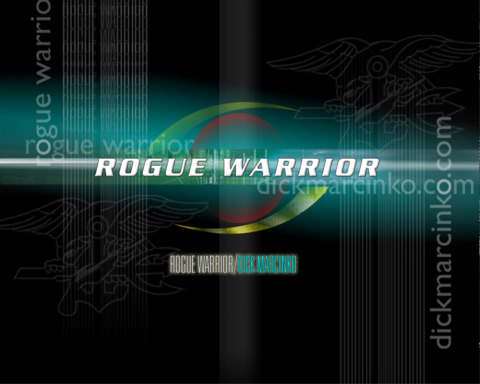
While we're on the topic of mental health, it's important to point out that Richard 'Reading Rainbow' Marcinko is in no way literally insane. He is not a psychopath, a sociopath, or any of the other popular oversimplifying diagnoses that have slipped into mainstream use thanks to the True Crime Industrial Complex. He is a sadist, but his sadism is in no way compulsive, in fact his control over it is astounding. He's a textbook narcissist, but that in no way inhibits his ability to control his actions. He is a very angry person, but his anger is not beyond his control, he doesn't come close to reaching the required diagnostic criteria for something like Borderline Personality Disorder. Richard Marcinko is a being entirely of his own making, and I would never presume to deny him credit for his choices by pathologizing them. Richard 'Lily of the Valley' Marcinko knows the difference between right and wrong; it's just that the specific version of right and wrong he believes in is absolute shit.
Studying the events of Richard 'Jem and the Holograms' Marcinko's life is to behold a process of almost perfect moral decline as he sprints from tragedy to tragedy, barreling heedlessly forward as he interprets his complete inability to learn anything from the dire consequences of his actions as ironclad proof of just how unassailably awesome he is. There was no way this was ever going to end in anything except tragedy, but by giving Marcinko command of Red Cell, the Navy ensured that he would have the power to inflict as much physical and mental harm on innocent people that he and his subordinates could before it all finally, finally came crashing down.
In Leadership Secrets of the Rogue Warrior: A Commando's Guide To Success, Marcinko documents how another man died during his SEAL Training. The man, identified only as Simpson, fell to his death during a HALO jump exercise because his parachute and backup parachute both failed to open. According to Marcinko:
“We watched helplessly as he fell to his death. To make matters more demoralizing, civilians recovered his body, and we had to go kidnap his broken remains from the morgue—because our operation was clandestine. The next day, we were back in the air. Nobody complained about the immediate resumption of training. Everyone understood. When you're a warrior, death is always looking over your shoulder.”
Marcinko takes no pleasure in men dying under his watch—however, he does take great pride in his ability to move past their deaths without reflecting on their circumstances for an instant. It's like he sees his ability to shrug off their deaths as proof of how incredible he is, as if there's no greater distinction to a commander than a stolid determination to learn nothing from failure. Many people are proud of their ability to stand resilient in the face of tragedy, but Richard 'Ruth's Chris Steak House' Marcinko is proud of his ability to plow through tragedy while learning absolutely nothing from it, in fact he takes his own indifference to it as proof that he was right all along, an excess of confidence so extreme it borders on the solipsistic.
Death and injury resulting from training accidents has been and continues to be shamefully common in all corners of the United States military, racking up casualties that dwarf those inflicted by enemy combatants, but Richard 'Moist Towelette' Marcinko is unique in his unwavering determination to leave such incidents in his dust along with anything that might possibly be learned from them, which goes a long way toward explaining why the opening chapter of his Rogue Warrior memoir begins with an account of both his parachutes failing to effectively open during a training exercise, and him just barely managing to force his backup chute to work before he was to, in his words: “splatter myself into strawberry-colored goo”. I don't know which incident happened first, Richard 'Smuckers' Marcinko's close brush with gooification or Simpson's tragic fate, but it seems like if Marcinko's had been willing to learn from the first incident, he possibly could have manged to prevent the second, similar one. Instead he brushes such occurrences off, writing
“The fact is, if you're not training hard enough to risk death, you're not really training.”
As he does with everything else, Marcinko takes this philosophy to its extreme, allowing him to interpret the death of his men as proof he's on the right track. In describing this mentality, he writes
“I, for one, have never allowed myself to bed led by fear, because fear is something that I simply will not succumb to.”
The unofficial motto of the Navy SEALs during Marcinko's tenure was “It pays to be a winner.”, a crude but effective sentiment that Demo Dick clearly took to heart. In his determination to barrel past fear of any kind, Richard 'Dream Drop Distance' Marcinko also jettisons his ability to doubt himself, rendering it impossible for him to question the morality of his actions, as his only criteria for success is whether or not he has won and, crucially, someone else has lost.

As a result Demo Dick lacks the self-awareness to perceive his own hypocrisy. When the Americans he was torturing demanded to be treated in accordance with the official laws regarding the treatment of prisoners of war and the Uniform Code of Military Justice, Marcinko laughed and tortured them some more. When he was removed from command of Red Cell and the Navy likewise came after him with a campaign of legal persecution that defied the spirit if not the letter of the law, Marcinko penned a book where he railed to the heavens at the flagrant injustice of it all, denouncing the petty motives of the Naval officials coming after him, saying they just wanted to indulge their egos and assert their power over him however they could. The parallels between what he did to fellow American soldiers and what the Navy command structure in turn did to him are completely lost on him.
One of the less obscene mottoes Richard 'Dippin' Dots' Marcinko subscribes to is “The more you sweat in training, the less you bleed in combat.'” Like everything else, he takes this idea to its logical extreme and beyond, reaching the conclusion that there is no possible horror you can visit on a person that won't ultimately improve them, up to and including torture. This may be true for a very small number of people who thrive in the most extreme conditions imaginable, like those individuals well disposed to Special Ops training, but for the overwhelming majority of people extreme pain is crippling, trauma is forever, and the road to recovery is long, difficult, and only partially effective. Richard 'Boogie Goblin' Marcinko's failure to grasp this represents a failure of empathy, a fundamental inability to imagine what life is like for people who are different from him, people who don't become hysterically angry if they aren't allowed to drink beer after a successful military exercise, to cite one example.
It's telling that, in the course of the Red Cell: The True Story documentary, Marcinko never attempts to make the case that the torture he and his men inflicted on fellow soldiers was intended to train them to resist torture, instead saying he waterboarded people to “just to bring them around the idea of what could happen to them.” The reason for this is because he knows there is no such thing as effective torture resistance training. This is reflected in military training materials all over the world. The IRA's Green Book, the Anti-Soviet manual Psychiatry for Dissidents, the Iranian guerrilla manual Torture and the Interrogation Experience, al-Queda's training manual, and the CIA's euphemistically titled Human Resources Exploitation Manual all offer no advice for enduring torture beyond vague encouragement to hang in there, baby.
The historical record bears this out. If exposing people to torture makes them more capable of resisting torture, wouldn't that defeat the purpose of extended periods of torture, since it would only make the victim stronger? If it's possible to grow accustomed to the sensation of drowning, why did the CIA perform fifteen waterboarding sessions on Khalid Sheik Mohammed? Were they pleased with how he was giving them less and less information as he grew ever more accustomed to being tortured? Did they just come to appreciate his fortitude somewhere around the tenth time? Did they start doing it recreationally, turning it into the torture equivalent of a keg stand where they chanted 'Endure!' instead of 'Chug!' ?
In the documentary, when the time comes for Richard 'Tricky Dick' Marcinko to justify the Red Cell Torture Program, he does the one thing he's never supposed to do: he makes excuses. He says he got carried away. He got emotional. He was tired. Mistakes were made on both sides. Shit happens. According to his own memoir Admiral Lyons told him “The idea, is not that you assholes shoot and loot like a bunch of crazies. The idea is that we teach the Navy how to make life difficult for terrorists.” If one of Demo Dick's own men deviated from a mission's parameters, then came to him with a similar batch of excuses, would Richard 'Gnome Nibbler' Marcinko have accepted them and excused his subordinate's behavior?
Somehow I doubt it.
In Leadership Secrets of the Rogue Warrior: A Commando's Guide to Success, Marcinko writes
“Red Cell, our team that tested the security of Navy installations by 'playing terrorist' was extremely successful at uncovering vulnerabilities. We were allowed to think, act, and live like terrorists. And once we got into that mind-set, it was astonishingly easy to identify weak spots and exploit them. We could 'see' the Navy better than it could see itself.”
However, Red Cell wasn't 'playing terrorist'. They weren't 'playing' at all. In their quest to prevent terrorism, Red Cell committed terrorism, enacting the very thing they—least in theory—had dedicated their lives to stopping. Every member of Red Cell deserves to bear the full legal repercussions of their crimes, but none of their criminal activities would have happened without Demo Dick in command. He makes this explicit in his self-help book, writing
“Another thing that happens when you lead from the front is that your people see exactly how you feel about every issue. It defines your character. And as your character becomes clear to your subordinates, it's easier for them to predict your desires, your reactions, and your behavior. They won't have to be mind readers to know what you want. Then, when they manage on their own, they'll know how you would have solved their problems.”
If we take Richard 'Torturer of Women' Marcinko at his word, it means he bears responsibility for everything Red Cell's members did even when he wasn't present, which includes the kidnapping and torture of Ronald Sheridan that finally spurred the Navy to action and, as Margret Sheridan hoped, stopped all their games.
Yet it never should have come to that in the first place. The only thing it would've taken to stop Richard 'Proud Destroyer of Families' Marcinko and Red Cell's campaign of recreational torture was someone in a position of high authority within the Navy issuing a command to end it. Unfortunately for the men and women in uniform at the time, an act like that would've bore a dangerously close resemblance to taking responsibility for something, so Richard 'Domestic Terrorist' Marcinko was left to do whatever the hell he wanted to until he finally went too far of his own accord.

The last sentence of Richard 'Baloney Pony' Marcinko's autobiography is: “And I will not fail.” But of course he fails. He fails all the time. Every human fails constantly. One could argue it's what our species is best at. The difference is Richard Marcinko thinks he can erase his failures by refusing to acknowledge their existence. The thing is, if you never admit you've made an error, then you're obliged to persist in that error lest you seem to contradict yourself, and the more your errors accrue, the more ironclad your refusal to admit them becomes, creating a cycle where the more you fail the more obliged you are to insist you're succeeding. This can happen on a global scale with things like Mao Zedong's man-made famine or America's military endeavors in Southeast Asia, but it also happens on an individual level. To err is human. To persist in error is first misguided, then deranged, and finally evil.
Whatever ultimately transpired behind the scenes, I can only hope that Bethesda Softworks and Rebellion Developments at some point realized they'd made a grave error when they decided to associate themselves with Richard 'Amusingly Ugly Christmas Sweater' Marcinko. Would the best way to honor his victims have been to cancel the Rogue Warrior game entirely, or is it good that it exists as a living monument portraying him as a hideous buffoon, even if barely anyone knows who he really is or what he really did? I don't know. Maybe the world we be a better place if, instead of destroying statues of people like Stalin, Mao, and various Confederate generals, we instead erected massive titanium signs next to them with an arrow pointing to them and the words THIS PERSON WAS A HUGE ASSHOLE. (We'll do it in comic sans; that'll show 'em.)
Sometimes history itself can seem like a blasted no man's land, consisting of nothing but the sprawled corpses of so-called Great Men and the ruin they wrought by paying for that title with the blood of innocent people, the whole enterprise one great unforced error. It can be so dispiriting that we the living feel compelled to redeem it somehow, as if the accumulated sins of the past have paid for some tangible asset we can redeem at the moral bank. All that sound and fury must signify something, right?
That depends entirely on us, and coming to grips with the realization that reveling in past glories and recoiling at past atrocities both have nothing to do with actually learning something from them.
As Built To Spill said, history doesn't teach, it makes note. Without intellectual interpretation, history is nothing but an inert heap of abstract, meaningless factoids. If we don't apply our own critical reasoning to history, we essentially surrender narrative control of it to whoever the loudest voice in the room is, a voice that also has a wicked tendency to be the stupidest, as there is often a direct correlation between the intensity of idiocy and the volume with which it's expressed.
The dead do not judge us, since one of the more pleasant side effects of no longer existing is complete and total magnanimity. Rather the dead are the lens we peer through in order to judge ourselves, the standard metric by which we evaluate who we are today. It's a view that's extremely easy to distort, so much so that humans have a wicked tendency to judge their ancestors in binary terms, either dismissing them as idiotic savages or idealizing them as Earthbound gods, with the prospect that they were in fact some modest variation on the same jerks we are now seemingly never occurring to us.
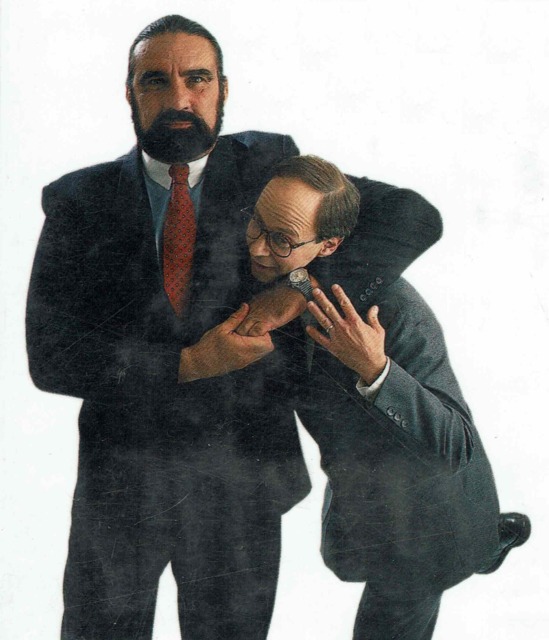
I think this the biggest reason why I am so intensely fascinated with Richard 'Disco Duck' Marcinko, even as I am profoundly disgusted by him on both an intellectual and visceral level. The details of his life embody so much that can go wrong with our society, and very seldom have I seen so many of the traits that lead humanity astray embodied in one lone historical figure. I'd even go so far as to say Richard 'Shazbot' Marcinko would make a great supervillain. He is, in many ways, the anti-Captain America. To Wit:
Captain America doesn't like bullies. Richard Marcinko is bullying personified.
Captain America challenges us to live up to the ideals we espouse. Richard Marcinko wants to win.
Captain America wants to convert his enemies over to his side. Richard Marcinko wants to skull fuck his enemies into oblivion.
Captain America wants a fair fight. Richard Marcinko believes victory goes to whomever is willing to commit the most atrocities.
Captain America is the product of the most noble aspects of World War Two, or at least the version we prefer to remember. Richard Marcinko is the product of the most shameful aspects of the Vietnam War, or at least the version we prefer to forget.
Like everyone else, I was first attracted to the Rogue Warrior video game by tales of how incredibly bad it was, and a morbid desire to experience that majestic awfulness firsthand. Now I can only look back and shake my head at that naïve yet attractive fool who ventured out in search of a cheap laugh only to become hopelessly mired in the life story of an individual whose importance to American military history is matched only by the utter repugnance of who he is and what he stands for. The more deeply I looked into who the protagonist of the Rogue Warrior game really was and what he really did, the more amazed I became at how no one had ever bothered to gather all the incredible, ridiculous facts together and compile them into one coherent story that could easily be shared with the world. This piece is my attempt to remedy that, to convey my best understanding of what happened and why, even if it's only so I don't have to keep this whole insane ordeal to myself.
In my growing senescence, I've come to accept that some history simply can't be demythologized, that at this point something like World War Two has been so heavily glamorized and dramatized that changing the version of it that exists in the popular imagination into one that hews more closely to historical fact would be like trying to create a purely factual version of Homer's Odyssey. However, that doesn't mean facts can't always be further elucidated, even if they're just confined to some random jackass's blog post.
Richard Marcinko doesn't deserve to be the sole chronicler of his life. He's bad at it. Even if he is at times painfully candid, he's also too eager to gloss over or excuse events that don't fit the glamorous and oh-so profitable image he likes to present to the world. Marcinko and the other participants in the Red Cell Torture Program will never suffer the full legal repercussions their crimes merit, but it is at least possible to deny them full control over the story of what happened, and even if their victims will never be given the justice they deserve, we can alltt them due respect by acknowledging their existence, and denying men like Marcinko the self-glorification they crave. That doesn't mean we'll be able to stop the next Demo 'Richard Marcinko' Dick in their tracks before they hurt anyone, but at least we'll know enough not to make a damn video game about how fantastic they are.
Or at least we'll know enough to make it as hideously terrible as Rogue Warrior is.
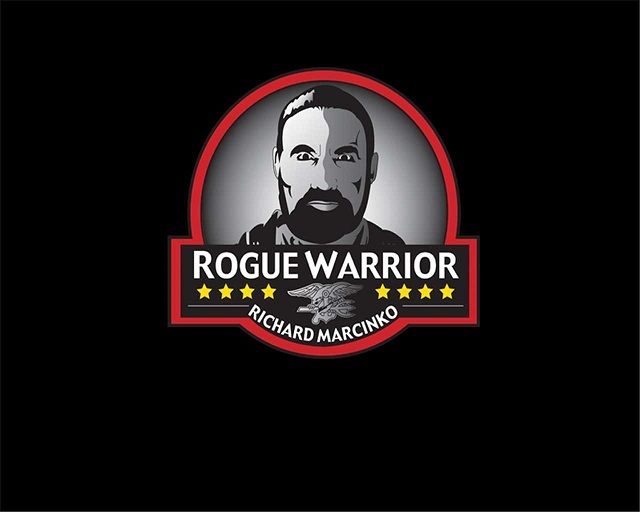
- Sources
Rogue Warrior: the explosive autobiography of the controversial death-defying founder of the Navy's top-secret counterterrorist unit—Seal Team Six, by Richard Marcinko with John Weisman, Pocket Books, 1992
Leadership Secrets of the Rogue Warrior: a commando's guide to success, by Richard Marcinko, Pocket Books, 1996
Born To Raise Hell, People Magazine, Elizabeth Gleick, May 4 1992
5 Myths About Torture and Truth, by Darius Rejali, Washington Post, December 16 2007
Webarchive, dickmarcinko.com, January 4 2010
Red Cell The True Story, LOTL Group, 1994
There is a Quick Look and Review of the Rogue Warrior game on Giant Bomb.
Log in to comment